
- Majors & Careers
- Online Grad School
- Preparing For Grad School
- Student Life

PhD Candidate vs Student: What’s the Difference?

Many people use the terms “PhD student” and “PhD candidate” interchangeably. However, these terms actually mean something quite different, including a different status level at universities.
We’re here to define the differences between a PhD candidate vs student, as well as other essential information, before you continue your educational journey.
Table of Contents
What I s a PhD student?
A doctoral student is anyone who is enrolled in a doctorate degree, also referred to as a Doctor of Philosophy (PhD) program. PhD students are typically required to complete a certain number of course credits and sit qualifying exams. Next, they can move on to conduct research and present it in the form of a dissertation.
A PhD is centered around self-directed research and possibly teaching/running tutorials, but they typically also involve a substantial amount of coursework and require attending classes, either online or in person.
Unlike candidates, PhD students are in the process of completing the required coursework for the degree. They haven’t passed the relevant qualifying exams yet.
What Is a PhD Candidate?
A PhD candidate has completed the required coursework and passed the qualifying exams for their doctorate program. They are currently working on their dissertation.
Most PhD students need to go through an application process and show they meet certain requirements such as a relevant master’s degree . To become a PhD candidate, doctoral students need to pass an internal application process, typically involving a set of exams.
This stage involves significant research usually in innovative areas and incorporating this into a dissertation (this stage is sometimes referred to as “all but dissertation” [ABD]), as they’ve completed all other aspects of the program and satisfied these requirements. To complete their doctoral journey, a PhD candidate must defend their dissertation. Once they’ve successfully done this, they will be awarded their degree and move from PhD candidate to doctor of their chosen field.
PhD Candidate vs Student: 6 Key Differences

There are a number of key differences between a PhD student vs PhD candidate, from their status to the structure and nature of study.
Note: Some universities have recently started adopting hybrid approaches (where there is no clear difference between PhD students and PhD candidates). These programs don’t involve any qualifying exams and students typically begin the dissertation as part of their coursework. Most schools, however, continue with the traditional distinction between a PhD candidate and PhD student.
1. Program Stage
A PhD student could be at any stage of the doctoral program . Coursework still needs to be completed and qualifying exams must be passed. Students may be in the initial stage of the program or about to complete the coursework (before beginning their research).
On the other hand, a PhD candidate has completed all coursework and has at least started their research. They may have completed their dissertation and are preparing to defend it.
2. Research Progress
A PhD student may not have selected their research topic or settled on a particular research question. A candidate’s research is in progress and they should already have a clear research question.
3. Relationship with Advisors
A PhD student may not yet have an advisor. A candidate has an established working relationship with their advisor and works closely with them to complete their research and dissertation.
4. Level of Support
Although they work closely with an advisor, a PhD candidate is generally expected to work more independently than a student enrolled in a doctoral student. Once candidates reach this stage of their doctorate, they typically won’t receive as much direction or supervision.
5. Flexibility and Structure
Understandably, PhD candidates have more freedom and flexibility in their work. Most candidates choose their area of research, as well as the methods used to conduct their work. As part of their coursework, PhD students usually have to work within a set structure (e.g., completing core subjects, meeting deadlines).
Being a PhD candidate comes with a certain degree of status. If they’ve demonstrated a degree of expertise through completing qualifying exams, candidates can put the letters PhD(c) after their name.
Tips for PhD Candidates

A PhD is an advanced degree designed to demonstrate expertise in a given field, as well as high-level skills and abilities in various areas (including research and writing). As such, earning a doctorate can be a challenging process.
The following tips for doctoral candidates will help you put your best foot forward and set yourself up for success.
Stay Organized
Because PhD candidates have to balance many competing priorities, organization is essential. Using organizational tools such as calendars, note-taking apps , and project management software can help you keep track of deadlines and meet your targets.
Focus on Your Research
PhD candidates likely have busy schedules with plenty of demands (such as teaching commitments and crafting a dissertation). As it’s the backbone of any doctoral program, be sure to prioritize this part of your work and monitor progress to stay on track.
Actively Seek Out Feedback
Because PhD candidates often work independently, there’s a risk of feeling isolated. Ask your advisors, mentors, and fellow candidates for feedback and advice. This will help ensure that you’re considering all aspects of your research question and multiple solutions, rather than focusing too intensely on a single area.
Take Advantage of Networking Opportunities
Networking is one of the biggest benefits for PhD candidates, so take full advantage of these events. Use this time to build a strong network of professors, advisors, fellow candidates, and other professionals you meet at conferences and events.
Take Care of Yourself
A PhD program can be taxing, and it’s easy for your mental and physical health to take a backseat. Make sure you exercise, eat well, and get enough sleep . Remember: Resting and recharging is crucial for working on your dissertation.
How Long Is a Typical PhD Candidacy?

Most PhD students require 1-2 years to complete their coursework and pass their qualifying exams. However, the length of a PhD candidacy is much more open. In most cases, programs take between two and five years, depending on:
- the complexity of the field of research
- the candidate’s other commitments, such as teaching load
- other abilities, such as a candidate’s level of organization.
Once a PhD candidate has completed their dissertation, they have to defend it successfully before a panel of faculty members before they can earn their doctorate degree. This process of defending a PhD dissertation can take several months.
Some universities specify a maximum length for PhD candidacy duration. For example, Carnegie Mellon University limits this to six years .
Benefits of Being a PhD Candidate
Being a PhD candidate can be rewarding for several reasons:
1. Research Opportunities
You’ll be exposed to vast research opportunities in your field. You may contribute to valuable discoveries while developing advanced knowledge and skills.
2. Networking
Through your PhD candidacy, you’ll also be in a great position to build gain a stronger network of fellow professionals.
3. Critical Thinking
A PhD candidacy can help you develop high intellectual independence and critical thinking skills.
4. Career Opportunitie s
A PhD is an advanced degree that allows you to build a rewarding career in the academic, government, and private sectors. PhD-holders can also expect to earn more than other graduates and are most likely to find a job.
5. Salaries
According to Northeastern University , professionals with a doctorate degree earn an average annual salary of $99,290 on average (and much more for the highest-paid PhDs ) and have a 1.5% unemployment rate. For master’s degree holders, the average annual salary is $81,867 average annual salary and a 2.6% unemployment rate.
6. Personal Fulfillment
Being a PhD candidate can help you pursue your passions. This advanced qualification will allow you to become a specialist in your chosen field, allowing you to hone in on the exact subject thatl fulfills you the most.
Qualifying Exams to Become a PhD Candidate

While requirements vary by program, to become a PhD candidate, most students will need to pass a set of exams. These will test students’ knowledge in the field, measure their research skills, and ensure they’re ready to start their dissertation research.
Traditionally, qualifying exams for PhD candidates involved a written test and an oral exam. These will cover a range of topics related to your field of study, with the oral component designed to demonstrate your level of understanding.
Some universities have recently started to issue doctoral students with a set of questions and have them submit the answers within a set timeframe (usually around two weeks). Other schools ask prospective doctoral candidates to submit a dissertation proposal instead of an exam.
Frequently Asked Questions
Can a phd candidate be called a doctor.
In most cases, a doctoral candidate cannot be called a doctor until after they successfully defend their dissertation and receive their doctorate.
Can I Put ‘PhD Candidate’ after My Name?
Once you’ve passed qualifying exams and embarked on dissertation research, you’re technically entitled to put “PhD candidate” or “PhD (c)” after your name. However, this is uncommon and not always recommended. It is generally more acceptable to mention that you are pursuing a doctorate (along with the field of research and university) or that you expect to complete your PhD in a certain year (on your CV and online profiles).
How Long Can You Be a PhD Candidate?
There isn’t a set length of time that a person can be a PhD candidate. The length of candidacy depends on a range of factors, including the subject of research and program requirements. Most PhD candidates complete this phase in around 3-5 years (where some university programs have set limits).
Do PhD Students Take Classes?
Yes, most PhD students must take classes and complete coursework as part of the first 1-2 years of their doctorate program. Once they’ve completed this coursework and passed qualifying exams, they move on to work on their research dissertation. At this stage, they’ll be considered a PhD candidate.
Key Takeaways
Now that you know the differences between PhD candidates vs. students, you’ve got a deeper understanding of how to obtain a doctorate. However you slice it, both will help you build your knowledge and skills to become an expert in your field.
However the program is structured, a PhD is a highly valuable degree that allows you to become a high-level professional and build a successful career.
If you know a PhD candidate who’s celebrating their accomplishments soon? Take a look at this guide to the best PhD graduation gifts .
- 10 Best PhD Programs in Pennsylvania
- Top 10 Best PhD in Cybersecurity Online Programs
- 10 Top PhD Programs in Chemistry
- The Top 10 Easiest PhDs: Tuition, Duration, and Financial Aid
- Top 10 Fully Funded PhD Programs and Universities
- Top 10 Best PhD in Medicine Programs

Lisa Marlin
Lisa is a full-time writer specializing in career advice, further education, and personal development. She works from all over the world, and when not writing you'll find her hiking, practicing yoga, or enjoying a glass of Malbec.
- Lisa Marlin https://blog.thegradcafe.com/author/lisa-marlin/ 12 Best Laptops for Computer Science Students
- Lisa Marlin https://blog.thegradcafe.com/author/lisa-marlin/ ACBSP Vs AACSB: Which Business Program Accreditations is Better?
- Lisa Marlin https://blog.thegradcafe.com/author/lisa-marlin/ BA vs BS: What You Need to Know [2024 Guide]
- Lisa Marlin https://blog.thegradcafe.com/author/lisa-marlin/ The 19 Best MBA Scholarships to Apply for [2024-2025]
14 Cheap Spring Break Destinations for College Students in 2024
How to get a master’s without a bachelor’s: the complete guide, related posts.

- Breaking Records: Yale Sees Most Selective Grad Admissions Season Yet

- 12 Best Laptops for Computer Science Students

- Is a Master’s Degree Worth It? [2024 Guide]
![phd candidate and student Graduate Certificate vs Degree: What’s the Difference? [2024 Guide]](https://blog.thegradcafe.com/wp-content/uploads/2024/03/GradCafe-Featured-Images-4-350x250.png)
Graduate Certificate vs Degree: What’s the Difference? [2024 Guide]

What is a Good GRE Score?

BA vs BS: What You Need to Know [2024 Guide]

Leave a Reply Cancel reply
Your email address will not be published. Required fields are marked *
Save my name, email, and website in this browser for the next time I comment.
Recent Posts
- Grad Trends: Interest in Artificial Intelligence Surges
- Applying to Big Tech This Year? Here’s How to Ace It.

© 2023 TheGradCafe.com All rights reserved
- Partner With Us
- Results Search
- Submit Your Results
- Write For Us

Research Voyage
Research Tips and Infromation
What is the Difference Between a PhD Candidate and a PhD Student?
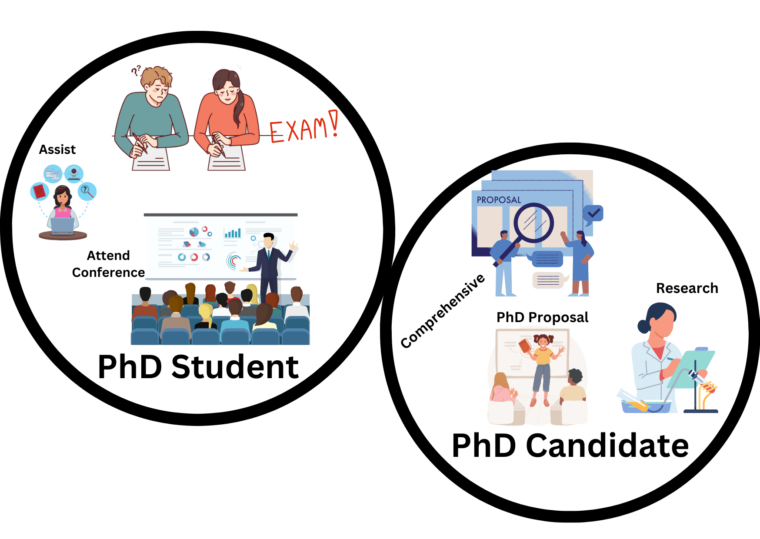
Pursuing a doctoral degree is a significant academic achievement that requires years of dedicated study, research, and intellectual rigour. Within the realm of doctoral studies, the terms ‘PhD candidate’ and ‘PhD student’ are commonly used, often interchangeably. However, a closer examination reveals that there are nuanced differences between these two designations. Understanding these distinctions is crucial for both prospective doctoral students and those seeking to comprehend the various stages of the doctoral journey.
In this article, we delve into the disparity between a PhD candidate and a PhD student, shedding light on the roles, responsibilities, and progression associated with each stage. We explore the specific criteria that differentiate a student from a candidate and the various milestones marking the transition. Additionally, we delve into the responsibilities and expectations that accompany each designation, illuminating the unique experiences and commitments faced by PhD candidates and students.
Furthermore, we acknowledge the variability in terminology across international boundaries, academic institutions, and disciplinary fields, providing insights into how different contexts might influence the usage of these terms. By the end, readers will have a comprehensive understanding of the contrasting aspects between a PhD candidate and a PhD student, facilitating informed conversations and a deeper appreciation for the intricate nature of doctoral education.
Introduction
Who is a phd student, when phd student attains status of phd candidate, variation in terminology.
Pursuing a PhD (Doctor of Philosophy) degree involves conducting original research in a specific field of study, making a significant contribution to knowledge, and demonstrating a high level of expertise. It is the highest academic qualification one can attain and is highly valued in academia, research institutions, and certain industries. A PhD signifies a deep understanding of a subject area, advanced analytical and critical thinking skills, and the ability to conduct independent research.
While the terms “PhD candidate” and “PhD student” are often used interchangeably, there are subtle differences between the two.
A PhD student typically refers to an individual who has been admitted to a doctoral program, actively engaging in coursework and other program requirements. They are in the early stages of their doctoral journey and are working towards completing the necessary academic components of their degree. On the other hand, a PhD candidate is typically someone who has progressed beyond the coursework stage and has advanced to the research phase of their program. They have usually completed comprehensive exams, passed a research proposal defense, and are actively engaged in independent research for their dissertation or thesis.
The purpose of this article is to provide a comprehensive understanding of the distinction between a PhD candidate and a PhD student. By exploring the criteria, milestones, and responsibilities associated with each designation, this article aims to clarify the unique experiences and progression of doctoral students. It also seeks to address the varying terminology used across different contexts and disciplines, enabling readers to grasp the intricacies of the doctoral journey and fostering informed discussions around this topic.
Through this article, readers will gain a comprehensive understanding of the journey from being a PhD student to becoming a PhD candidate and the distinct roles and responsibilities associated with each stage.
A PhD student is an individual who has been admitted to a doctoral program and is actively engaged in pursuing their doctoral studies. They are at the initial stages of their doctoral journey, seeking to expand their knowledge, skills, and expertise in a specific field of study. PhD students play a vital role in academic research communities as they contribute to the generation of new knowledge and the advancement of their discipline.
PhD students are required to complete a set of coursework specific to their field of study. These courses are designed to provide a foundation in the discipline, enhance research skills, and broaden the student’s understanding of relevant theories and methodologies. Coursework may include seminars, advanced classes, and specialized topics. The specific coursework requirements can vary between programs and disciplines.
Example: Imagine a student named Alex who has just been accepted into a doctoral program in psychology. At this stage, Alex is considered a PhD student as they begin taking relevant coursework, attending seminars, and collaborating with faculty members. They are laying the foundation for their research and acquiring the necessary knowledge in their field.
Who is a PhD Candidate?
Advancement from being a PhD student to a PhD candidate typically involves meeting specific requirements set by the doctoral program. These requirements may vary depending on the institution and field of study but often include successful completion of coursework, exams, and other program-specific milestones.
One of the primary requirements for transitioning to a PhD candidate is the successful completion of coursework and exams. PhD students are expected to complete a designated set of courses, which provide a broad understanding of their field and research methodologies. They are also required to pass comprehensive exams, which assess their comprehensive knowledge and understanding of their research area.
As part of the transition to becoming a PhD candidate, students typically prepare and defend a research proposal. The research proposal outlines the scope, objectives, methodology, and significance of the intended research. The proposal defense may involve presenting the proposal to a committee of faculty members, who evaluate its feasibility, rigour, and contribution to the field. Additionally, PhD students often have to pass comprehensive exams, which test their knowledge of their research area and related disciplines.
If you are not familiar with writing PhD proposal and making PhD proposal presentation, then visit my articles on “ How to Write PhD Proposal Presentation to the University ” and ” How to Make a PhD Proposal Presentation to the University Panel” . These articles will guide you through the process of preparation and presentation of PhD proposal to the University panel.
Upon successful completion of the requirements, PhD students are often granted candidacy status. Advancement to candidacy signifies that the student has demonstrated the necessary knowledge, skills, and potential to conduct independent research and contribute to their field. This status allows students to focus more exclusively on their research and dissertation work.
Once students become PhD candidates, there is a shift towards an increased emphasis on independent research. They are expected to dedicate a significant portion of their time and effort to conducting original research, collecting data, analyzing results, and making novel contributions to their field. The focus is primarily on their dissertation or thesis work, which serves as the culmination of their doctoral studies.
Example: Let’s consider a PhD student named Alex in the field of computer science. After completing their coursework and passing comprehensive exams, Alex develops a research proposal outlining their intention to investigate the applications of machine learning in cybersecurity. They present the proposal to a committee of faculty members, who assess the feasibility and potential impact of the research.
Alex successfully defends their research proposal and is granted candidacy status, transitioning from a PhD student to a PhD candidate. With candidacy status, Alex’s focus shifts towards conducting independent research. They spend considerable time collecting and analyzing cybersecurity datasets, developing and refining machine learning algorithms, and testing their effectiveness in detecting and preventing cyber threats.
As a PhD candidate, Alex works closely with their advisor, regularly discussing research progress, seeking guidance, and receiving feedback. They collaborate with other researchers in the field, attend conferences to present their findings and contribute to the scholarly community through publications. The focus is now on producing an original and significant contribution to the field of computer science through their dissertation.
The transition to PhD candidacy marks a critical stage in the doctoral journey, as it signifies the ability to independently drive research and make scholarly contributions. PhD candidates like Alex are immersed in the world of research, expanding knowledge, and pushing the boundaries of their field.
Terminology related to PhD candidates and PhD students can vary internationally and among different academic institutions. In some countries, the terms “PhD candidate” and “PhD student” may be used interchangeably, while in others, there may be specific distinctions. For example, in the United States, “PhD student” is commonly used, while in the United Kingdom, “PhD candidate” is more frequently employed. Additionally, different universities or institutions may have their own terminology preferences, which can create further variation.
Terminology can also vary based on the disciplinary field of study. Different academic disciplines have their own conventions and terminology for referring to individuals pursuing a doctoral degree. For instance, in the sciences, one might encounter terms like “graduate researcher” or “doctoral candidate.” In the humanities and social sciences, the terms “PhD candidate” and “PhD student” are often used. This variation reflects the specific linguistic and cultural norms within different academic domains.
In Canada, for instance, doctoral students are commonly referred to as “PhD candidates,” regardless of their stage in the program. In Australia, “PhD candidate” is the preferred term for those who have completed the required coursework and have advanced to the research phase. In contrast, in the United States, “PhD student” is frequently used to refer to individuals at all stages of their doctoral studies.
Disciplinary variations can also be observed. In engineering, individuals pursuing a doctoral degree are often referred to as “PhD students” or “doctoral students.” In contrast, in the field of education, the term “PhD candidate” is commonly used to denote those who have advanced to the research and dissertation stage.
It is important to note that these examples represent general trends, and there can still be variation within specific institutions and programs. The usage of terminology can evolve over time and may be influenced by regional or institutional preferences.
The distinction between a PhD candidate and a PhD student holds significant importance in the realm of doctoral education.
While these terms are often used interchangeably, they represent different stages and responsibilities within the doctoral journey. A PhD student is in the initial stages of their program, actively engaging in coursework, research, and academic requirements.
On the other hand, a PhD candidate has advanced beyond coursework, passed comprehensive exams, and is focused primarily on independent research and the completion of their dissertation.
Upcoming Events
- Visit the Upcoming International Conferences at Exotic Travel Destinations with Travel Plan
- Visit for Research Internships Worldwide

Recent Posts
- EditPad Research Title Generator: Is It Helpful to Create a Title for Your Research?
- Are Postdoctoral Fellowships Taxable? A Guide to Understanding Tax Implications
- How to Get Off-Cycle Research/Academic Internships
- How to End Your Academic/Research Internship?
- PhD or Industry Job? A Comprehensive Career Guide
- All Blog Posts
- Research Career
- Research Conference
- Research Internship
- Research Journal
- Research Tools
- Uncategorized
- Research Conferences
- Research Journals
- Research Grants
- Internships
- Research Internships
- Email Templates
- Conferences
- Blog Partners
- Privacy Policy
Copyright © 2024 Research Voyage
Design by ThemesDNA.com

PhD Candidate vs PhD Student

突然发现好久没写东西了,写一篇随笔吧。
这几日实验室的师弟师妹们在准备系里的博资考,大家聊起来,说过了博资考,以后就可以把简历里的PhD Student改成光荣的PhD Candidate了。一听这个我顿时觉得饶有兴趣,在我2017年入学的时候更新过一次简历,当时觉得写个PhD Candidate比PhD Student要来的霸气得多,后来一问其他人,说过了博资考才算Candidate,之前只能算Student。那可没办法,毕竟博三才能参加博资考,现在只能弟弟一点管自己叫Student了。后来在忙碌的学习、工作和研究之中不知不觉过了博资考,竟再也懒得更新自己的简历了。
回到题目,其实PhD Candidate是一个非常非正式的说法,甚至没有对应中文的直译(博士候选人?似乎从没听过有人这么称呼自己,一般还是管自己叫博士生),而通常只在英文语境下会出现。做了些许小调查,在Quora上面有一个提问叫 When can you say you are a PhD candidate? ,下面有位UIUC的教授回答:
Jeff Erickson, CS professor, University of Illinois Urbana-Champaign Answered November 5, 2020 At least in the computer science departments I've been part of, there is no such thing as a "PhD candidate"; there are only PhD students. Some PhD students have satisfied their course requirements; others have passed qualifying exams; others have successfully proposed a thesis topic. All of them are supposed to be doing research, ideally from the day they walk in the door (if not sooner). Maybe there's a "candidate" flag in some university database, but honestly, nobody cares. Before you defend and deposit your dissertation, you're a PhD student. After you defend and deposit your dissertation, you have a PhD. There are no intermediate stages. (See also: "ABD".)
说到底,在正式拿到学位之前,都只是个PhD Student,而这里也提到了一个概念,即ABD(All but dissertation)。ABD似乎与PhD Candidate更为接近,若按照这个定义来看的话,在清华大学的博士生们,至少要过了博士论文选题报告和博士论文中期考核,开始撰写论文草稿了才算完成了All requirements but dissertation,那就得至少到博四或者博五了。
到了博四博五的人,还会在意自己是Candidate还是Student吗?想必是不会的,这个年级的人所面临的压力,已经不会令他再去在意这些细节,毕竟早有科研、项目、工作甚至身体上的事等着他去操心。而且即使完成了论文初稿、过了预答辩,后面还有盲审在等待着,似乎每一道关卡都充满着风险,时刻在敲打着高年级博士生的内心。毕竟一直做一个PhD Candidate而不能转为正式的PhD,似乎是一件更令人痛苦的事。
李宗盛在《山丘》中唱到:“越过山丘,才发现无人等候。喋喋不休,时不我与的哀愁。”前半句的话,每个博士生怕是各有各的体验,有的人越过山丘,发现无人等候;有的人越过山丘,发现前面还有更高的山,根本望不到边;有的人越过山丘,发现前面一堆人在等候,从师资博后、讲师、助理教授、副教授一直排着队……不过时不我与的哀愁,应该大家都能体验到罢。那种时间一下子过去一周、一个月而自己仍在原地踏步的感觉,绝对是本科生们不敢体会的。
这么说来PhD Candidate与修行很像了。《金刚经》的一相无相分提到,佛陀问须菩提:“须菩提!于意云何?须陀洹能作是念:‘我得须陀洹果’不?” 须菩提言:“不也,世尊!何以故?须陀洹名为入流,而无所入,不入色声香味触法,是名须陀洹。”博士候选人名为候选,其实是nobody cares,真正离PhD学位触手可及的人,应该也不会想着说:“我现在是PhD Candidate了”。
最后回到开头吧,一个博士生什么时候才能称自己为PhD Candidate呢?其实啥时候都行吧,不过最好是过了博资考之后。要是这称呼能为自己带来一些快乐,then do it。话说回来,Student就很没排面吗?学过概率论的人应该都知道,William Sealy Gosset的笔名就是Student,人家还发现了t分布和t检验呢。
- QUICK LINKS
- How to enroll
- Career services
The difference between doctoral students and doctoral candidates
By Brian Fairbanks
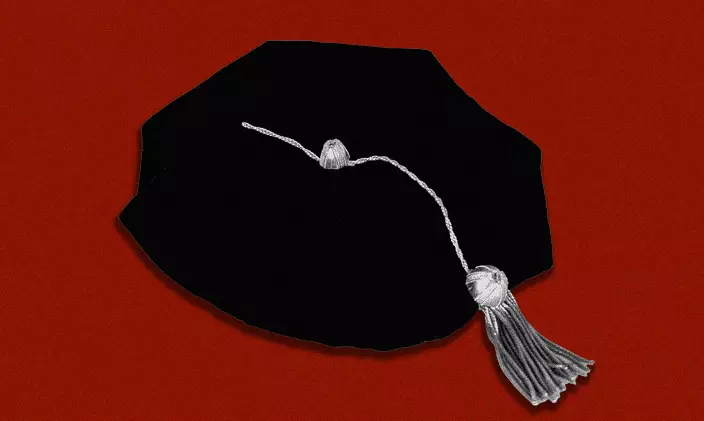
This article has been vetted by University of Phoenix's editorial advisory committee. Read more about our editorial process.
This article has been reviewed by Hinrich Eylers, PhD, PE, MBA, Vice Provost for Academic Operations and Doctoral Studies
This article was updated on January 2, 2024.
At a glance
- A doctoral degree , whether a PhD or a practitioner doctorate, is the highest academic achievement one can pursue at a university.
- A doctoral student is an individual who’s been accepted into a doctoral program and is working through classes and coursework. A doctoral candidate has completed the coursework portion of a doctoral program and is focused on writing a dissertation or equivalent project.
- Other doctoral programs include MDs, JDs, ODs, DCs and AudDs. Notably, many of these programs do not include a dissertation.
- Explore online doctoral programs in business, nursing, education and healthcare at University of Phoenix.
Many people who earn a doctoral degree will, at some point, be both a doctoral student and doctoral candidate. While these roles may seem mysterious from outside the (real or virtual) halls of academia, the distinction is fairly simple.
Before we cover the distinction, however, let’s get on the same page about doctoral degrees.
What is a doctoral degree?
In academia, one degree sits at the very top: the doctoral degree. Also referred to as a doctorate, a doctoral degree is the most advanced educational credential you can earn. Though some fields of study (like journalism) don’t have a doctoral degree, most typical academic fields do, as do the fields of health, medicine, law, education and business.
Doctoral programs can lead to a PhD in a variety of fields, such as literature, philosophy and history, or a practitioner doctorate in a field like business, health administration, nursing or education. Doctoral degrees involve years of intensive study, and many require a book-length dissertation. However, practitioner doctorates have different requirements and may not entail a dissertation.
Learn more about online doctoral degrees at UOPX!
Requirements of a doctoral program
Before graduate school, you must complete years of university courses, typically two degrees, before a program will consider admitting you. However, some programs have more lenient requirements than others.
Doctoral programs tend to be intentionally difficult and rigorous courses of study. As mentioned, there are several educational levels before a doctoral degree that both students and candidates will need to pass.
The requirements for a doctoral student include:
- Prerequisite degrees: Doctoral programs usually require that students obtain a bachelor’s and a master’s degree first.
- Required coursework: Each program requires different courses, but most will be in the student’s area of study, with some focused on adjacent or complementary subjects. Additionally, foundational coursework prepares students to learn about the research process.
- Qualifying exams: Typically, students must pass qualifying exams to enter doctoral programs, but not all programs require entrance exams.
If a dissertation is part of the doctoral program, the doctoral candidate must:
- Select a dissertation advisor or committee: During your time as a doctoral student, you will come into contact with many instructors. You will typically only interact with the instructors who are your dissertation advisor or on your dissertation committee. The committee is the audience for the doctoral candidate and ensures the candidate demonstrates command of the literature and methodologies relative to their field.
- Choose your dissertation topic: This is a pivotal point in your journey to earning a PhD or doctorate. Many programs ask for a general topic as part of your initial application. Your advisors will help you to create a specific and unique dissertation topic that will fuel your work over the next several years.
- Write the dissertation: Your dissertation or thesis will normally take a couple of years to write and will be a book-length culmination of your learning and research.
- Defend your dissertation or thesis: After you submit your final draft to your dissertation committee, you will need to orally present your work to the committee, answer questions and defend your work.
The requirements for a doctorate take many years to complete. While some people complete doctoral degrees in three to five years, others take seven to 10 years. The time span depends on your specific area of study, whether you take classes on a full-time or part-time schedule and how long it takes to complete your dissertation. This also includes your level of focus and intent.
read similar articles
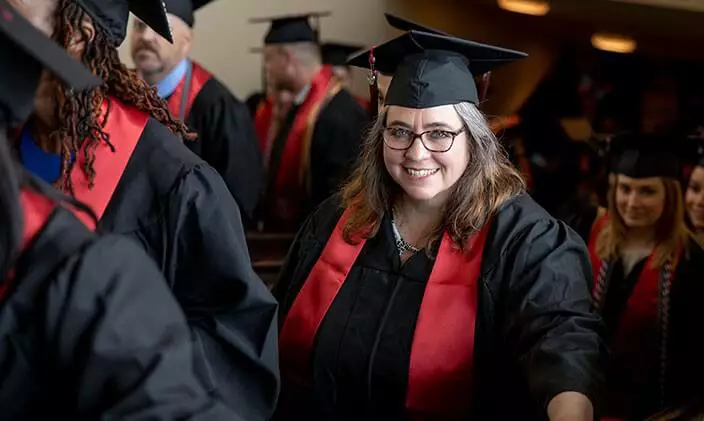
A guide to all 4 college degree levels
Doctoral candidate vs. doctoral student.
If you are interested in earning your doctorate, then it is important to understand the difference between being a doctoral candidate and a doctoral student.
What is a doctoral student?
A doctoral student is a person currently enrolled in a doctoral program at a university. Being a doctoral student involves completing a certain number of credits and coursework in an area of study and completing and passing several exams.
After students pass the qualifying exams (if the program requires it) and successfully complete required coursework, they become doctoral candidates.
What is a doctoral candidate?
A doctoral candidate leaves behind the structured learning schedule of a student. No longer does the candidate attend regular classes or take exams. Instead, they embark on a self-guided schedule for writing a dissertation. This culminates their studies and is tailored to their unique and individual areas of interest.
Doctoral candidates work closely with the advisors who make up their dissertation committee. The advisors provide guidance and critiques as the candidate writes a book-length dissertation. While the advisors can help along the way, what sets the candidate apart from the student is that, rather than simply learning what others have already discovered, they are conducting and writing about their own original, approved research — and then demonstrating what they’ve learned, as well as how it fits in the broader field of study or can be applied to tangible problems.
The meaning of candidacy in other doctoral programs
A PhD is not the only type of doctoral degree. There are also practitioner or professional doctorates, which may take the specific shape of medical doctorates, optometry doctorates, audiology doctorates, chiropractic doctorates, juris doctorates and others.
Such programs have their own conventions and terminology for various milestones. Some doctoral degrees, such as for law or medicine, focus on mastering the practice of a specific subject and the skills associated with that practice. As a result, terms such as candidate are not used universally among doctoral programs, and many of these programs do not include a dissertation.
PhD vs. practitioner doctorate
A PhD, or Doctor of Philosophy, is a doctoral degree that is focused on expanding and enriching an area of research. A PhD student typically focuses on developing new and original knowledge based on theory.
In contrast, a practitioner doctorate prepares students for leadership roles in their desired profession by applying existing knowledge to solve problems in their field or community. The practitioner doctorate generally involves rigorous curriculum, culminating in a dissertation or applied project that addresses a particular real-world problem.
Requirements of a practitioner doctorate and many practitioner programs
The requirements of a particular practitioner doctorate will vary according to the institution and the field of study. This makes sense when you consider that practitioner doctorates vary from juris doctorates to doctors of physical therapy.
While there may be similar experiences involved in the course of study, such as residencies or internships, the requirements are unique to the specific degree.

3 ways to jump-start your doctoral experience
Doctorates at university of phoenix.
While University of Phoenix (UOPX) does not have PhD programs, we do offer several online doctorates. Students might choose the UOPX programs because classes are flexible and offered online, and because of our unique “ Scholar-Practitioner-Leader model .”
Our doctoral programs are:
- Doctor of Business Administration — Gain the strategic vision and skills to position yourself as a business leader. This program teaches skills such as how to solve organizational problems, design and conduct research studies, introduce innovative business ideas to the industry and more.
- Doctor of Management — This program equips you with critical thinking skills to find creative solutions to complex problems, so you can bring out the best of your leadership skills.
- Doctor of Education — Learn how to use analytical, critical and innovative thinking to improve performance and solve complex problems in education.
- Doctor of Health Administration — If you’re a health professional who is seeking greater responsibility in shaping the future of the health sector, the Doctor of Health Administration can help you get there. You’ll study the challenges inherent to today’s healthcare landscape, including economic fluctuations, burgeoning patient needs and industry-changing legislation.
- Doctor of Nursing Practice — This program is designed for working nurses who require a doctorate for advanced practice or nurses who desire their terminal degree. It does not prepare students for professional certification or state licensure as a nurse or as an advanced practice nurse.

ABOUT THE AUTHOR
Brian Fairbanks is a freelance writer with a background in SEO content creation and blog article development
want to read more like this?

What is a Dissertation? A Guide
University life.
May 30, 2022 • 9 minutes

3 Ways to Jump-Start Your Doctoral Experience
September 28, 2022 • 5 Minutes

Get Mentally Fit with Critical Thinking
July 24, 2023 • 6 minutes

PhD Student vs. PhD Candidate

How I use gentle, digital nudges to stay current in the post-exams world
July 6, 2017 | Alison L.
Do you know the difference between a PhD student and a Ph.D. candidate?
A candidate is someone who has fulfilled all the requirements for the degree except the dissertation.
I’m a historian (see my earlier post about being a humanist at MIT ), so my path to candidacy differs a bit from other doctoral tracks at MIT. But whatever the discipline, the transition from student to candidate is an arduous process.
My department’s requirements involved: completing two years of coursework; demonstrating proficiency in a research language other than English; submitting at least one grant application; writing and revising a dissertation proposal that the dissertation committee must approve; and, most grueling of all, passing qualifying exams.
I became a candidate on November 24, 2015, after a weeklong examination period that involved three separate seven-hour written exam and a two-hour oral examination during which our committee members can grill us on anything they please.
I felt prepared for the written exams, which were open note, because I’d done nothing but read, take notes, and revise for the four months leading up to the exams.
But I lost sleep (at a time when I really couldn’t afford to be losing sleep) fretting about the oral exam. I shouldn’t have worried as much as I did. While there were a couple moments of panic—like when I blanked on the two ecozones separated by Wallace’s line—I survived “quals.”
So, what do you do once you become a candidate?
First, you take a break. I gave myself a little over a month to relax. I worked on lower-stakes projects, read fiction, attended departmental lectures, caught up with colleagues. I enjoyed the holidays at home in Chicago.
But once the New Year rolled around, a new sense of panic set in. Without the motivating pressure of exams to keep me working at a breakneck pace, how would I ever stay up-to-date in my fields? This anxiety, I’m willing to guess, is one shared by almost all academics.
While I’m actually more interested in how others have handled this pressure—comment away please!—I wanted to share a few tips I’ve picked up for keeping au courant .
1. Sign up for eTOCs That acronym stands for email Table of Contents alerts. Most journal publishers have a system that allows you to receive emails detailing the contents of their most recent releases. Sign up for a few of these and you’ll receive quarterly reminders that make it easier to stay on top of developments in the literature.
For some fields, it might not be necessary to read entire journals. In that case, pick some keywords and set up a bunch of Google Scholar alerts. Talk to your advisors and peers to see what works best in your discipline.
2. Make social media work for you Choose one social media platform and turn it into a research tool. My platform of choice is Twitter. You might be surprised by the number of scholars and professional associations that use social media. I rarely tweet myself, but I check Twitter at least once each day to find links to interesting articles, news about gatherings in my field, and to follow the work of scholars I admire. In addition to yielding worthwhile information, my Twitter sessions have the added benefit of tricking my brain into thinking it’s taking a break from work.
If you’re wondering how to curate your Twitter feed, first take a look at papers you’ve written for classes or published. See if the scholars that you cite in your own work are on Twitter and go from there. This is the most casual form of networking, but especially for introverts (like myself) these social media e-introductions facilitate in-person conference meetings, which can lead to future collaborations.
3. Listservs make life easier Most people at MIT know about the free food listserv. I’m not a member because I don’t need that kind of temptation in my life. Still, I’m a big fan of using listservs to join intellectual communities. In addition to the handful of MIT-based lists that tell me about upcoming lectures and workshops here on campus, I receive emails from communities at other Cambridge- and Boston-based schools. I’m also on a few listservs for universities in other cities. Even if I’m never able to attend those events, I know who is working on what where. If academia is about staying in the know, listservs help you do that.
I’ve written this from the perspective of a PhD candidate who needed gentle, digital nudges to stay current in the post-exams world, but I hope they prove useful for students, candidates, and beyond. Now comes the important question: What are your strategies for staying up-to-date?
Share this post:
This site uses cookies to give you the best possible experience. By browsing our website, you agree to our use of cookies.
If you require further information, please visit the Privacy Policy page.
Want to Get your Dissertation Accepted?
Discover how we've helped doctoral students complete their dissertations and advance their academic careers!
Join 200+ Graduated Students

Get Your Dissertation Accepted On Your Next Submission
Get customized coaching for:.
- Crafting your proposal,
- Collecting and analyzing your data, or
- Preparing your defense.
Trapped in dissertation revisions?
Phd candidate vs student, published by steve tippins on may 19, 2020 may 19, 2020.
Last Updated on: 2nd February 2024, 03:03 am
You make the transition from PhD student to PhD candidate after you complete all your coursework and your comprehensive exams (if required). A PhD candidate’s sole task is to conduct their research and write their dissertation.
In other words, a PhD student is still completing their coursework. They could be on the first day of their PhD program. A PhD candidate has completed all of the requirements for their degree except their dissertation (yes, that’s the infamous “ all but dissertation ” status).
PhD candidacy means you’re a PhD in training. Now you’re ready to spread your wings a little–with some guidance.
Your time as a PhD candidate is your chance to demonstrate that you are ready to be an independent scholar. It’s also your chance to screw up and have that be okay–to have support. Your committee will help you. Since it’s the first time you’ll go through the process of creating and performing a study on your own, there’s no reason to believe you’ll be perfect at it. That’s why the process is designed so that your committee can give you guidance.
But besides the simple definition above, what are the implications of being a PhD candidate vs student? Turns out, there are many important differences. Without keeping these in mind when you become a PhD candidate, it’s easy to spin out and get off track and not understand why.
PhD Candidate vs Student: What Are the Differences?

While “PhD Student” and “PhD Candidate” are both steps on the journey to getting a PhD, there are significant differences between them. Here are some of the differences between PhD candidate vs student.
Lack of Structure
When you’re doing coursework, there is structure; there are assignments and deadlines. Of course, in graduate coursework teachers aren’t on top of you to turn in assignments like they would be in an undergraduate program. However, there is a deliverable (final project, test, etc) that you have to complete each quarter. You have things to complete by a certain time in order to move forward.
Once you become a candidate, there’s no syllabus and there are no due dates. It’s completely up to you to move forward in the process.
Some people find it hard to make the transition to the lack of structure that comes with being a PhD candidate.
Academic Writing
Academic writing skills become really important when writing your dissertation –more important even than they were during the coursework phase of graduate school. Academic writing is essentially a new language, with very specific meanings and requirements.

For example, you can’t just say “people believe x or y,” you have to say who they are and how you know that, giving citations to back it up. Many words (like “significant”) have very specific meanings and can’t be used the way you might use them in speech.
As a PhD student, your professors should be teaching this language to you, so that as a PhD candidate, it will come as second nature.
How Many People Do You Have to Keep Happy?
Here’s another difference between being a PhD student vs PhD candidate: as a PhD candidate, you reduce the number of people that you have to keep happy.
As a student, you have to keep in mind the requirements from each professor teaching your classes, as well as matriculation requirements from the department, preferences and advice given by your advisor, and even the research interests of the people for whom you’re writing papers.
Over 50% of doctoral candidates don’t finish their dissertations.
Once you become a candidate, it’s just your committee that you have to keep happy, meaning that those are the people who will hold you accountable and outline the requirements for completion of the degree. For that reason, you’ll want to choose your committee members with care.
Hopefully, by the time you need to choose your committee, you’ll have encountered professors who are intrigued by your research interests and with whom you feel personally and professionally compatible.
Freedom to Choose

When you become a PhD candidate, you get to work on what you want to work on. You can pursue the topic that interests you instead of whatever goes with the course you’re in. It’s a time to really apply all those skills you were accumulating in the classes. For example, the statistical procedures you learned in stats classes and theories you learned in the courses for your discipline.
This is the stage of culmination, when everything you’ve learned becomes not the goal, but the foundation for your own body of work. It’s one of the exhilarating (and sometimes intimidating) parts of being a PhD candidate vs a student.
Expectations and Support
Faculty often use the “go wander in the woods” approach for PhD candidates. It’s essentially like hearing, “Go find things and come back to me when you’ve got something.” They’ll usually tell you when it’s not enough, but they might not give you much direction about what they’re looking for beyond that.
The reason for this is to encourage independent scholarship. They want you to have the opportunity to build your own case for why and how this topic should be studied. But this first foray into academic independence can be quite a challenge.
When they tell you to “go wander in the woods,” they’re not even telling you what kind of tree to look for. Sometimes you get specific directions, but sometimes you get vague answers like “go look for more.” This can be frustrating. Many clients come to me because they need more direction, which is understandable.

In your coursework, you were often given studies to read or asked to find studies on particular topics that relate to the course topic. Dissertation research is more nebulous. Your committee members want you to decide which directions to go in and which kinds of studies best relate to your research questions.
They won’t be asking you for the “right answer.” They’ll be asking you, “Why? Justify what you did or plan to do.”
Here’s another difference between PhD candidate vs student: a PhD candidate can put “PhD(c)” after their name, indicating that they have achieved status as a PhD candidate. However, I suggest using caution with this designation. The APA has expressed concern that its use may be misleading to the general public and cause people to believe you have a PhD.
PhD Candidate vs Student: An Interview With a PhD(c)

Did you notice a change in how professors viewed you, once you moved from “student” to “candidate”?
Yes. It actually happened during my comprehensive exams. Before that, when I had been asked a question, the professor already knew the answer and was asking to see if I knew also. In my comprehensive exams, I had become the expert and my committee members were actually asking questions out of interest.
We were all pieces of a puzzle at that point. Instead of them saying, “tell me about John Dewy’s influence on education in the 1920s,” they asked, “How do you think Dewey influenced the school system’s openness to parental involvement in schools?” The professor who asked that was genuinely interested, because she was an expert in educational history but had not specifically studied parent involvement in schools, as I had.
That moment represented a big shift for me; it meant that as a PhD candidate, I had to then take responsibility for my own learning, because nobody knew as much as I knew about that particular thing.
It’s exhilarating on one hand, because you suddenly realize you’re the expert. On the other hand, it’s scary because we’re used to somebody else knowing the answer, being able to correct us if we’re wrong.
A Narrowing of Scope

It sounds like your topic was centered on something very particular, so maybe not a lot of other people have studied what you want to study?
Yes, that’s true. When you go through a PhD program your research area is pretty narrow. You start out with a general interest in something, but as you go through your classes, specific areas start to stand out.
I started out with an interest in egalitarianism in public education, but my own past experience combined with some seminal texts to direct me toward parent involvement in schools, specifically. Some books and articles showed me that how schools treat parents can be an indicator of egalitarianism, maybe a clearer one than any rhetoric about the students.
So, there’s this winnowing effect, as you move forward. Your professors love to watch this, too. Especially in the smaller, seminar classes, they seem to be waiting to see what makes your heart beat faster.

Speaking of your heart beating faster, is one distinction of the candidacy phase to have more passion about the work you’re doing?
I think that’s ideal, for sure. It doesn’t always happen, because some professors are really after students who will jump onto their research platform, because they can piggyback on the students’ research to get more publications. Good committee chairs, though, will want you to find your own path toward something you can happily spend a lifetime studying.

I suspect that one of the reasons people don’t finish their dissertations is because they weren’t really passionate about the topic in the first place. It’s only one possible reason, but it should give a doctoral student pause.
It’s really hard to finish a PhD, so you want to knock down any barriers to finishing. Being passionate about the topic will keep you going when things feel onerous. It’s like marrying someone with a sense of humor — even when you’re not getting along very well, there’s something you can always appreciate about your spouse.
Imposter Syndrome

What about “ imposter syndrome ”? Does that come into play when you become a candidate?
It sure did for me! To be one of the only people who’s an expert in that field feels like a huge responsibility because people are depending on you. Your research has to be accurate because people will be making policies based on your conclusions.
Even with good intentions, your conclusions can be erroneous, and there are plenty of historical examples of policies being made on the basis of erroneous conclusions. The consequences can be enormous. And that’s all on you!
So then the questions become, “Am I really up to this?” “Who am I to drive policy?” “I’m just a fallible human being, so why would (or should) anyone listen to me?” Especially right after comps, I was thinking, “How could I be the expert? Nothing really has changed about me; I’m still the same person. Yesterday, I was a student, but today I’m an expert?”

My observation is that this happens with women more than men, probably because women in authority positions are more often questioned than are men. But even for men, this seemingly sudden transformation can make you worry that you’re not qualified for the responsibility you’re being given.
The thing is, It’s not really as sudden as it seems. You’ve been studying something for, say, four years, so you have a claim to expertise. And you’ve been narrowing your interests all along the way, so you’ve been slowly building up your expertise.
Besides, in many good schools, you get warned a lot about how easy it is to make a mistake in research and how easy it is to make false conclusions. They beat that into you so much that it can become a constant doubt.
In most primary and secondary schools, and sometimes even in college, they teach you to sit down, shut up, and learn something. For people to suddenly be saying, “tell me what you think,” can be challenging. I suspect that that’s another major reason people who finish their coursework don’t complete their dissertation: they’re not sufficiently prepared for this shift in roles.
Suggestions for PhD Candidates

Having been through this shift yourself, do you have any advice for students in this stage of their process?
Mostly, I think it’s a matter of taking personal responsibility and seeing yourself in a new light. It helps me to consider this process as a transformation — like a caterpillar into a butterfly. The “student” stage is the caterpillar stage, where you’re eating the milkweed, the knowledge, to nourish you.
Then there comes a time when you’ve got to stop being a consumer and transform into a real researcher. That’s like the metamorphosis stage when the caterpillar is in the chrysalis, melting down. (And I have had plenty of meltdowns myself in this stage!) That’s when you’re on your own, writing the dissertation.
That chrysalis stage is a real slog. You try as hard as you can, and your proposal still gets rejected — twice. Or the IRB wants you to structure the study differently, after your committee has already approved it. Or you can’t get enough participants for your quantitative study or enough data for your qualitative study — whatever. It’s the biggest challenge of most people’s life!

But if you stick with it, you actually do get this huge reward. As a butterfly, or a PhD, you bring something unique to the world. You have an important role in society that can potentially change the course of history — even if you don’t envision that in the beginning.
And that’s why the committee makes the process arduous. They want to be sure you’re great at what you do, because there is potentially an awful lot riding on your shoulders. I’m actually grateful for the rigor they demand. I want to feel ready for the role I’m taking.
Ultimately, candidacy is time in the chrysalis. It’s a time of transformation, built on one’s time as a student. It’s a time in the dark and alone, which makes it challenging, for sure. But I trust I’ll eventually emerge strong enough to spread my wings.
Steve Tippins
Steve Tippins, PhD, has thrived in academia for over thirty years. He continues to love teaching in addition to coaching recent PhD graduates as well as students writing their dissertations. Learn more about his dissertation coaching and career coaching services. Book a Free Consultation with Steve Tippins
Related Posts

Dissertation
What makes a good research question.
Creating a good research question is vital to successfully completing your dissertation. Here are some tips that will help you formulate a good research question. What Makes a Good Research Question? These are the three Read more…

Dissertation Structure
When it comes to writing a dissertation, one of the most fraught questions asked by graduate students is about dissertation structure. A dissertation is the lengthiest writing project that many graduate students ever undertake, and Read more…

Choosing a Dissertation Chair
Choosing your dissertation chair is one of the most important decisions that you’ll make in graduate school. Your dissertation chair will in many ways shape your experience as you undergo the most rigorous intellectual challenge Read more…
Make This Your Last Round of Dissertation Revision.
Learn How to Get Your Dissertation Accepted .
Discover the 5-Step Process in this Free Webinar .
Almost there!
Please verify your email address by clicking the link in the email message we just sent to your address.
If you don't see the message within the next five minutes, be sure to check your spam folder :).

- Code of Ethics
- Dissertation Editing
- Dissertation Coaching
- Free Consultation
Ph.D. Candidate vs Ph.D. Student – What’s the Difference?
One of the most significant milestones in any doctoral education is the transition from Ph.D. student to Ph.D. candidate. While the change in title may be the difference of only one word, getting the distinction of being a Ph.D. candidate represents a major step forward on the journey to earning a dissertation. Though a Ph.D. candidate has not yet fulfilled all of the requirements for earning a doctorate, they are well on their way.
The elevation in title from Ph.D. student to Ph.D. candidate is an accomplishment recognized both within a student’s home department and institution and beyond. In addition to being that much closer to earning a Ph.D., achieving the designation of Ph.D. candidate also opens professional and academic doors to new opportunities. Prior to becoming a Ph.D. candidate, it’s a good idea to become informed about what it entails.
These are a few frequently asked questions about what it means to become a Ph.D. candidate:
- How do you become a Ph.D. candidate?
- What is the difference between being a Ph.D. student and a Ph.D. candidate?
- What are the benefits of being a Ph.D. candidate?
- How long does Ph.D. candidacy last?
Becoming a Ph.D Candidate
Transitioning from Ph.D. student to Ph.D. candidate is a fairly straightforward, if involved, process. To become a Ph.D. candidate, you must first complete all of your academic coursework–required classes, electives, colloquia, the whole nine yards. Early in a Ph.D. program, most Ph.D. students are also tested during an oral qualifying exam with two or three department faculty members to ensure they are making adequate progress in the program.

Once all classes are completed, Ph.D. most students sit for comprehensive exams. These are written exams (sometimes with an additional oral component) designed to test both broad knowledge of the field as well as narrow subject matter. Many Ph.D. students regard comprehensive exams as a major hurdle on their path to completing their Ph.D.
As a Ph.D. student, comprehensive exams (“comps” for short) were definitely my greatest source of anxiety on the road to earning my degree. I spent months studying for these exams, reading hundreds of books and articles in order to prepare myself to answer just three questions. Looking back, getting ready for these exams and passing them was definitely the most intense part of getting my Ph.D.. T he transition from Ph.D. student to Ph.D. candidate can feel like a crucible for proving yourself up to the task of writing a dissertation.
Ph.D. Student Versus Ph.D. Candidate
Though the distinctions between being a Ph.D. student and a Ph.D. candidate may seem subtle, they are significant. In some ways, becoming a Ph.D. candidate feels like entering a new world, one laden with additional expectations. As a senior member of your graduate cohort, you may take on a mentoring role for new Ph.D. students in your department. You may also be asked to serve as a department student representative on university committees.
Though Ph.D. candidates are technically finished with coursework, many opt to take independent study courses with faculty whose research aligns with their own. This helps guide the Ph.D. candidate’s own research, and may even shape their dissertation. Between researching, writing, wading into the job market, and teaching (for those on a fellowship), a Ph.D. candidate’s day is as full as ever.

Having the freedom to dedicate the bulk of my time to my own research was one of my favorite parts of being a Ph.D. candidate. There are very few opportunities in life to devote yourself wholly to the study of one narrow topic, and it can be very rewarding. In addition to writing your dissertation, this is also a great chance to map out the first couple academic articles that you’ll write after graduating.
Benefits of Being a Ph.D. Candidate
While being a Ph.D. candidate often means accepting additional responsibilities in your department, it also leads to new and exciting opportunities . Ph.D. candidates are afforded more consideration for conference papers and panels, as well as travel and research funding. In many departments, Ph.D. candidates are a priority for faculty and also receive a lot of mentoring.
Though the leviathan of the dissertation looms ahead of them, some Ph.D. candidates may also feel like the pressure on them is less intense, and for good reason. Doctoral coursework is a proving ground, and a difficult one at that. Successfully making the leap from Ph.D. student to Ph.D. candidate means that you have what it takes to go the distance and complete your degree. Keep that in mind!

Length of Ph.D. Candidacy
During the period of Ph.D. candidacy, doctoral candidates are designated as being ABD , or “all but dissertation.” The length of time that a Ph.D. candidate has to finish their dissertation is not indefinite. At most institutions, dissertations must be completed within six years, barring extenuating circumstances. Before embarking on your dissertation , it’s a good idea to check with your advisor or department chair and confirm the time limit.
The period of Ph.D. candidacy is a great time to begin the shift from student to professional. The year that I spent between coursework and graduation shaped me into a professional academic. In addition to researching and writing, I also organized department events, attended conferences, created my professional dossier, and went on the academic job market. It was a busy year, but I also learned a lot.
Regardless of the department’s timeclock for the completion of your dissertation, you’ll want to set up your own schedule and timeline for researching, writing, and defending your dissertation . For most Ph.D. candidates, this process takes 1-3 years, but it’s specific to each individual. You will be the best judge of how much time you need to complete your dissertation. Pace yourself and keep your eye on the prize!
Related posts:

Courtney Watson, Ph.D.
Courtney Watson, Ph.D. is an Associate Professor of English at Radford University Carilion, in Roanoke, Virginia. Her areas of expertise include undergraduate and graduate curriculum development for writing courses in the health sciences and American literature with a focus on literary travel, tourism, and heritage economies. Her writing and academic scholarship has been widely published in places that include Studies in American Culture , Dialogue , and The Virginia Quarterly Review . Her research on the integration of humanities into STEM education will be published by Routledge in an upcoming collection. Dr. Watson has also been nominated by the State Council for Higher Education of Virginia’s Outstanding Faculty Rising Star Award, and she is a past winner of the National Society of Arts & Letters Regional Short Story Prize, as well as institutional awards for scholarly research and excellence in teaching. Throughout her career in higher education, Dr. Watson has served in faculty governance and administration as a frequent committee chair and program chair. As a higher education consultant, she has served as a subject matter expert, an evaluator, and a contributor to white papers exploring program development, enrollment research, and educational mergers and acquisitions.
Comments are closed.
How to Finish Your Dissertation in Half the Time
Learn how to avoid the pitfalls preventing you from finishing your dissertation faster.
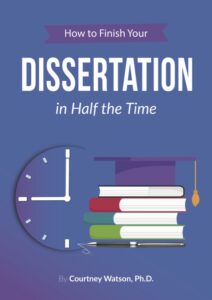
Subscribe to get the free eBook!
Dr. Courtney Watson In the News
“ See It for Yourself ” in With Good Reason: Beyond the Book July 22, 2022
“ I Thought You’d Never Ask: Consent in Contemporary Romance ” in New Frontiers in Popular Romance (McFarland) June 13, 2022
- Common Errors
- Dissertation Success
- Presentation
- Quantitative Analysis
- Surviving Grad School
“How to Finish Your Dissertation in Half the Time”
- 7 Dissertation Writing Tips You Definitely Need to Know
toughdecisions.net
make your dissertation writing a breeze
Phd candidate vs student: explaining the difference.
When looking to finish a doctorate, you will often come across 2 similar terms: “PhD candidate” and “PhD student.” To many people, these terms represent the same thing. However, academics and those who have passed through a doctorate program understand that there is a major difference between both terms.
As a fresh or aspiring PhD student, you must understand the difference between a doctoral student and a doctoral candidate. This article will seek to explain the PhD candidate meaning and explore the definitions of what it means to be a candidate and a student.
PhD student vs candidate
A PhD student is currently enrolled in a PhD program. The learning style for these students is hybrid, meaning that a student can learn either online, on-site, or both. Students who are enrolled in this type of program are often required to complete certain course credit loads and pass exams. The program involves a ton of research, dissertation work, academic writing, and defense.
A PhD candidate, on the other hand, is someone who has done all but completed and submitted a dissertation. It is the transition and progression phase from studentship to candidateship. This title or tag is earned when a student completes all coursework and passes all examinations required by the university. Having explained this, the highlight of their variance lies in the completion of the required coursework.
Distinctions between a PhD candidate vs PhD student
To better understand the differences between these two groups of people, their variances will be highlighted and explained below.
A common question often asked is: do PhD students take classes? The obvious answer to this is yes, they do. The structure of assignments, deadlines and coursework differs for a PhD student and a candidate. There is a lack of structure for a PhD candidate. You are free from following deadlines or syllabi. The progress of your dissertation is completely at your pace. Whereas, as a PhD student, you are guided by deadlines and an academic structure that you must meet to complete your doctoral program.
- Academic writing
The amount of academic writing required of you as a PhD candidate would be far greater than that required of you as a student. Remember that your dissertation alone carries the bulk of your candidateship, and this consists of about three hundred pages’ worth of research work.
- Academic circle
Your academic circle reduces when you become a PhD candidate. The number of people you will need to academically communicate with will also decrease. The reason for this is that as a student, you must meet all of your professors’, departments, colleges, and advisors’ requirements. But, as a candidate, your academic circle revolves around your committee.
As a candidate, you have the freedom to decide your topic, theme, and research style. It is a time for you to implement and showcase the practical and theoretical processes that you learned as a student. A PhD student does not have this privilege; instead, all topics are chosen by the professor.
A candidate does not receive as much support as is required, although so much more is expected of them. For instance, a student would be given tasks to work on with the objective in mind. But a candidate would be left to independently find an objective and work towards it.
A PhD candidate can put the PhD title before their names, but a student cannot. However, this practice is not entirely encouraged as it might mislead the public into thinking you already have a doctorate degree.
While the above clearly differentiates between a PhD student and a PhD candidate, there is a minor confusion between a researcher, candidate, and a student in doctoral programs. While the terms PhD candidate and PhD student differ, a doctoral researcher is a term used to describe “all” students who are pursuing PhD degree in any university.

You Might Also Like

30 Hot Dissertation Topics in Education to Research This Year
Dissertation abstract writing: what no one is talking about, guide on how to publish a dissertation & dissertation sections, leave a reply cancel.

What is a PhD?
- Types of Doctorates
- A Doctor of Philosophy (PhD) is the highest globally recognized postgraduate degree that higher education institutions can award.
- PhDs are awarded to candidates who undertake original and extensive research in a particular field of study.
- Full time PhD programmes typically last three to four years, whilst part time PhD programmes typically last six to seven years.
- A PhD can lead to an academia teaching role or a career in research. A PhD can also equip you with skills suitable for a wide range of jobs unrelated to your research topic or academia.
Definition of a PhD – A Doctor of Philosophy (commonly abbreviated to PhD , Ph.D or a DPhil ) is a university research degree awarded from across a broad range of academic disciplines; in most countries, it is a terminal degree, i.e. the highest academic degree possible.
PhDs differ from undergraduate and master’s degrees in that PhDs are entirely research-based rather than involving taught modules (although doctoral training centres (DTCs) offer programmes that start with a year of lecture-based teaching to help develop your research skills prior to starting your project).
In most English-speaking countries, those that complete a PhD use the title “Doctor” (typically abbreviated to Dr) in front of their names and are referred to as such within academic and/or research settings. Those that work in fields outside of academia may decide not to use the formal doctor title but use post-nominal letters (e.g. John Smith PhD); it’s unusual though for someone to use both the Doctor title and post-nominal letters in their name.
PhD vs Doctorate
A PhD and a professional doctorate are both research-based terminal degrees.
However, where a PhD focuses on original research mostly around theoretical concepts, a professional doctorate focuses on examining existing knowledge to solve real-life, practical problems.
While there is much crossover between the two, a PhD is generally better suited for an individual to wants to advance the knowledge and understanding in their field, and a professional doctorate degree is better suited to a working professional who wants to better be able to apply knowledge and understanding to their field.
What Are the Entry Requirements for a PhD?
To be accepted on to a PhD programme, students usually need to hold at least a high ( 2:1 and above ) undergraduate degree that is related to the field of research that they want to pursue. A PhD candidate may also be expected to hold a Master’s degree , however, this does not mean you must have one, as it is still possible to enrol into a PhD without a Master’s .
Self-funded courses may sometimes be more relaxed in relation to entry requirements. It may be possible to be accepted onto a self-funded PhD programme with lower grades, though these students typically demonstrate their suitability for the role through professional work experience.
Whilst a distance learning project is possible , most PhD candidates will carry out their research over at least three years based at their university, with regular contact with two academic supervisors (primary and secondary). This is particularly the case for lab-based projects, however, some PhD projects require spending time on-site away from university (e.g. at a specialist research lab or at a collaborating institution abroad).
How Long Does a PhD Take?
Typically, full-time PhDs last 3-4 years and part-time PhDs last 6-7 years. However, at the discretion of the university, the thesis writing-up period can be extended by up to four years.
Although most doctoral programmes start in September or October, they are generally much more flexible than taught-courses and can start at any time of the year.
How Much Does a PhD Cost?
Tuition fees for UK and EU students vary between £3,000 and £6,000 per year, with the average tuition fee of £4,712 per year for 2023/24 programmes.
Tuition fees increase considerably for international students, varying between £16,000 to £25,000 per year, with an average tuition fee of £19,600 per year .
Nonetheless, most students will secure PhD funding in the form of studentships, scholarships and bursaries to help pay for these fees. These funding opportunities can either be partial, which cover tuition fees only, or full, which cover both tuition fees and living expenses.
UK national students can also apply for Doctoral Loans from Student Finance England if they are unable to secure funding.
Finding a PhD has never been this easy – search for a PhD by keyword, location or academic area of interest.
What Does a PhD Involve?
To be awarded a PhD, a doctoral student is required to produce a substantial body of work that adds new knowledge to their chosen field.
A PhD programme will typically involve four key stages:
Stage 1: Literature Review
The first year of a PhD involves attending regular meetings with your supervisors and carrying out a search on previously published work in your subject area. This search will be used to produce a literature review which should set the context of the project by explaining the foundation of what is currently known within the field of research, what recent developments have occurred, and where the gaps in knowledge are. In most cases, this will be an extension of your research proposal should you have produced one as part of your application. The literature review should conclude by outlining the overarching aims and objectives of the research project. This stage of setting achievable goals which are original and contribute to the field of research is an essential first step in a successful PhD.
The supervisor is the main point of contact through the duration of a PhD – but remember: they are there to mentor, not to teach, or do it for you . It will be your responsibility to plan, execute and monitor your own work as well as to identify gaps in your own knowledge and address them.
Stage 2: Research
The second year (and prehapse some of your third year) is when you work on your research. Having identified novel research questions from your review of the literature, this is where you collect your data to help answer these questions. How you do this will depend on the nature of your doctoral research: for example, you may design and run experiments in a lab alongside other PhD students or visit excavation sites in remote regions of the world. You should check in regularly with your supervisors to update them and run any ideas or issues past them.
Have the structure and chapters of your thesis in mind as you develop and tackle your research questions. Working with a view of publishing your work will be very valuable later on.
Stage 3: Write up of Thesis
The next key stage of a PhD is writing a doctoral thesis , which typically takes from anywhere between three months to one year. A thesis is a substantial body of work that describes the work and outcomes of the research over the previous two to three years. It should tell a detailed story of the PhD project – focusing on:
- The motivations for the research questions identified from the literature review.
- The methodologies used, results obtained, and a comprehensive analysis and discussion of the findings.
- A detailed discussion of the key findings with an emphasis on the original contributions made to your field of research and how this has been impactful.
There is no universal rule for the length of a PhD thesis, but general guidelines set the word count between 80,000 to 100,000 words.
For your thesis to be successful, it needs to adequately defend your argument and provide a unique or increased insight into your field that was not previously available.
Stage 4: Attending the Viva
A viva voce , most commonly referred to as just a ‘ viva ‘, is an interview-style examination where the PhD student is required to engage in a critical appraisal of their work and defend their thesis against at least two examiners. The examiners will ask questions to check the PhD student has an in-depth understanding of the ideas and theories proposed in their thesis, and whether they have developed the research skills that would be expected of them.
The viva is one of the final steps in achieving a PhD, and typically lasts at least two hours, but this duration can vary depending on the examiners, the university and the PhD project itself.
Once you have done the viva – you’re on the home stretch. You will typically be asked to make some amendments to your thesis based on the examiner’s feedback. You are then ready to submit your final thesis for either:
- PhD – If you pass the requirements you will be awarded a PhD degree (most common outcome),
- MPhil – If you failed to meet requirements for a PhD, you may be downgraded to an MPhil degree (uncommon outcome),
- Fail – No award is given, typically for cases of plagiarism (extremely uncommon outcome).
What Is It Like to Undertake a PhD?
We’re often asked what it is like to undertake a PhD study. Unfortunately, this isn’t a simple answer to this question as every research project is different.
To help give insight into the life of a PhD student, we’ve interviewed PhD students at various stages of their programmes and put together a series of PhD Student Interviews . Check out the link to find out what a PhD is like and what advice they have to offer you.
What Are the Benefits of A PhD?
A PhD is the highest globally recognised postgraduate degree that higher education institutions can award. The degree, which is awarded to candidates who demonstrate original and independent research in a particular field of study, is not only invaluable in itself, but sets you up with invaluable skills and traits.
Career Opportunities
First, a PhD prepares you for a career in academia if you wish to continue in this area. This takes form as a career in the Higher Education sector, typically as a lecturer working their way to becoming a professor leading research on the subject you’ve studied and trained in.
Second, a PhD also enables the opportunity for landing a job in a research & development role outside of the academic environment. Examples of this include laboratory work for a private or third sector company, a governmental role and research for commercial and industrial applications.
Transferable Skills
Finally, in possessing a PhD degree, you can show to employers that you have vital skills that make you an asset to any company. Three examples of the transferable skills that you gain through a PhD are effective communication, time management, and report writing.
- Communication – presenting your work in written and oral forms using journal papers and podium presentations, shows your ability to share complex ideas effectively and to those with less background knowledge than you. Communication is key in the professional environment, regardless of the job.
- Time management – The ability to prioritise and organise tasks is a tremendous asset in the professional industry. A PhD holder can use their qualification to demonstrate that they are able to manage their time, arrange and follow a plan, and stick to deadlines.
- Report writing – Condensing three years of work into a thesis demonstrates your ability to filter through massive amounts of information, identify the key points, and get these points across to the reader. The ability to ‘cut out the waffle’ or ‘get to the point’ is a huge asset in the professional industry.
Aside from the above, you also get to refer to yourself as a Doctor and add fancy initials after your name!
What Can I Do After a PhD?
One of the most desirable postdoctoral fields is working within independent Research and Development (R&D) labs and new emerging companies. Both industries, especially R&D labs, have dedicated groups of PhD graduates who lead research activities, design new products and take part in crucial strategic meetings. Not only is this a stimulating line of work, but the average salaries in R&D labs and emerging start-ups are lucrative. In comparison, an undergraduate with five years of experience within their given field will, on average, likely earn less than a new PhD graduate taking on a R&D position.
It’s a common misunderstanding that PhDs only opens the door for an academic career such as university lecturers and training providers. Although obtaining a PhD opens these doors, the opportunities extend far beyond educational roles. In fact, recent data from the UK’s Higher Education Statistics Agency (HESA) indicates only 23% of PhD graduates take a position in educational roles . This low percentage is primarily because PhD graduates have a wide range of skills that make them suitable for a broad spectrum of roles. This is being seen first hand by the increasing number of PhD graduates who are entering alternative roles such as research, writing, law and investment banking.
How Do I Find a PhD?
We appreciate that finding a PhD programme to undertake can be a relatively daunting process. According to Higher Education Student Statistics , over 22,000 PhDs were awarded in 2016/17 within the United Kingdom alone. Clearly there are a huge number of PhD programmes available. This can sometimes be confusing for prospective doctorates, particularly when different programmes are advertised in different places. Often, it is difficult to know where to look or where to even start. We’ve put together a list of useful sources to find the latest PhD programmes:
- A great place to start is with our comprehensive and up-to-date database of available PhD positions .
- Assuming you are still at university, speak to an existing PhD supervisor within your department.
- Attend as many postgraduate open days as you can. Whilst there, speak to current PhD students and career advisors to get an awareness of what PhDs are on offer.
- Visit the postgraduate section of university websites and the PhD Research Council section of the UKRI website.
Browse PhDs Now
Join thousands of students.
Join thousands of other students and stay up to date with the latest PhD programmes, funding opportunities and advice.
What is a PhD? Advice for PhD students
How long does it take to get a doctorate degree how do you get into grad school are you qualified to do a phd answers to these questions and more.
What is a PhD?
A PhD, which stands for “doctor of philosophy”, is the most advanced academic degree. It’s earned through extensive research on a specific topic, demonstrating expertise and contributing new knowledge to the field.
What does “PhD” mean?
The term “PhD” is often used as a synonym for any doctoral-level qualification. Doctorate degrees can often be split into two categories: MPhil and PhD.
An MPhil is similar to a PhD as it includes a research element (which is usually shorter and less in-depth than a PhD thesis, and often more akin to a dissertation undertaken at undergraduate or master’s level).
MPhil students focus more on interpreting existing knowledge and theory and critically evaluating other people’s work rather than producing their own research. The precise nature and definition of an MPhil can vary among institutions and countries.
A PhD, meanwhile, follows a more widely known and traditional route and requires students, often referred to as “candidates”, to produce their own work and research on a new area or topic to a high academic standard.
PhD requirements vary significantly among countries and institutions. The PhD, once completed, grants the successful candidate the title of “doctor of philosophy”, also called PhD or DPhil.
What is a professional doctorate?
A professional doctorate is a kind of degree that helps people become experts in their fields. Instead of focusing mainly on theory and research like a regular PhD, a professional doctorate is all about practical skills and knowledge.
This kind of doctorate is great for students who want to get better at their jobs in areas like teaching, healthcare, business, law or psychology. The courses and projects in these programmes are designed to tackle real problems you might face at work.
For example, you might have heard of the doctor of education (EdD), doctor of business administration (DBA), doctor of psychology (PsyD) or doctor of nursing practice (DNP). These programmes combine learning, hands-on projects and sometimes a thesis paper or essay to show you’re skilled at solving on-the-job challenges.

How long does it take to study a PhD?
The time required to complete a PhD can vary significantly based on several factors. Generally, a full-time PhD programme takes around three to six years to finish. However, it’s important to take into account individual circumstances and the nature of the research involved.
1. Full-time vs. part-time: If you’re studying full-time, dedicating most of your time to your studies, it usually takes about three to four years to complete a PhD. However, studying part-time while managing other commitments might extend the duration. Part-time PhDs can take around six to eight years, and sometimes even longer.
2. Nature of research: The complexity of your research proposal can influence the time required. Certain research questions may involve intricate experiments, extensive data collection or in-depth analysis, potentially leading to a longer completion timeline.
3. Field of study: The subject area you’re researching can also affect the necessary time. Some fields, such as sciences or engineering, might involve more hands-on work, while theoretical subjects might require more time for literature review and analysis.
4. Supervision and support: The guidance and availability of your academic supervisor can affect the pace of your research progress. Regular meetings and effective communication can help keep your studies on track.
5. Thesis writing: While the research phase is crucial, the stage of writing your thesis is equally significant. Organising and presenting your research findings in a clear and cohesive manner can take several months.
6. External commitments: Personal commitments, such as work, family or health-related factors, can influence your study time. Some students need to balance these alongside their PhD studies, potentially extending the duration.
7. External Funding: The availability of funding can also affect your study duration. Some funding might be linked to specific project timelines or research objectives.
So, although a PhD usually takes between three and six years of full-time study, with potential variations based on research complexity, enrolment as part-time or full-time, field of study and personal circumstances. It’s vital to have a realistic understanding of these factors when planning your PhD journey.
How long is a PhD in the UK?
In the UK, the length of a PhD programme typically ranges from three to four years of full-time study. As explained above, there are many factors to consider.
How long is a PhD in the US?
Similarly to the UK, in the United States, the duration of a PhD programme can vary widely depending on the field of study, research topic and individual circumstances. On average, a full-time PhD programme in the US typically takes between five and six years to complete.
Why does it take longer to study a PhD in the US?
PhD programmes generally take longer to complete in the US than in the UK due to various factors in the education systems and programme structures of each country:
1. Programme structure: UK PhD programmes often emphasise early, focused research from the first year, leading to shorter completion times. In contrast, US programmes commonly include more initial coursework in your first and second year and broader foundational training, which can extend the overall duration.
2. Course work requirements: Many US PhD programmes require a lot of course work, which can lengthen the time needed to finish. UK programmes tend to have fewer or no course work demands, allowing students to concentrate primarily on research skills.
3. Research funding: In the UK, PhD funding is often awarded with specific timeframes in mind, motivating completion of the research degree in the agreed duration. In the US, funding approaches can vary, requiring students to secure funding from multiple sources, potentially affecting their progress and completion time.
4. Teaching responsibilities: Some US PhD students take on teaching roles as part of their funding, dividing their time and potentially prolonging their studies.
5. Research approach: Differences in research methodologies and project scopes can affect the time needed for data collection, experimentation and analysis.
6. Academic culture: The US education system values a well-rounded education, including coursework and comprehensive exams. This can extend the time before full-time research begins. UK PhD programmes often prioritise independent research early on.
7. Part-time and work commitments: US PhD candidates might have more flexibility for part-time work or other commitments, which can affect research progress.
8. Dissertation requirements: US PhD programmes generally include a longer and more comprehensive dissertation, involving more chapters and a broader exploration of the research topic.
These variations in programme structures, funding models and academic cultures contribute to the differing completion times between the two countries.
What qualifications do you need for a PhD?
To be eligible for a PhD programme, certain educational qualifications are generally expected by universities. These qualifications serve as indicators of your readiness to engage in advanced research and contribute to the academic community.
First, an undergraduate or bachelor’s degree in a relevant field is typically the most common requirement. This degree provides you with a foundational understanding of the subject and introduces you to basic research methodologies. It serves as a starting point for your academic journey.
Do you need a master’s degree to get into a PhD programme?
In addition to an undergraduate degree, many PhD programmes also require candidates to hold postgraduate or master’s degrees, often in fields related to the intended PhD research. A master’s degree offers a deeper exploration of the subject matter and enhances your research skills. Possessing a master’s degree signifies a higher level of expertise and specialisation.
The combination of both undergraduate and postgraduate degrees demonstrates a solid academic background. This background is crucial before you engage in doctoral study because pursuing a PhD involves more than just knowledge; it requires advanced research abilities, critical thinking and the capacity to provide an original contribution and new insights into the chosen field of study.
While these qualifications are usually requested, there are exceptions. Some institutions offer direct-entry programmes that encompass bachelor’s, master’s and PhD degrees in a streamlined structure. This approach is often seen in scientific and engineering disciplines rather than humanities.
In exceptional cases, outstanding performance during undergraduate studies, coupled with a well-defined research proposal, might lead to direct entry into a PhD programme without requiring a master’s degree.
Admission requirements can vary between universities and programmes. Some institutions might have more flexible prerequisites, while others could have more stringent criteria. Make sure that you thoroughly research all admission requirements of the PhD programmes you’re interested in to ensure you provide the right information.
Are PhD entry requirements similar in other countries?
PhD entry requirements in Canada and Australia can be somewhat similar to those in the UK and the US, but there are also some differences. Just like in the UK and the US, having a bachelor’s degree followed by a master’s degree is a common way to qualify for a PhD in Canada and Australia. However, the exact rules can vary, such as how much research experience you need or the grades you should have.
In Canada and Australia, as in the UK and the US, international students usually need to show their English language skills through tests like IELTS or TOEFL. And, like in other places, you might need to give a research proposal to explain what you want to study for your PhD.
But remember, even though there are some similarities, each country has its own rules.
PhD diary: Preparing for a PhD Nine things to know before doing a PhD Women in STEM: undertaking PhD research in cancer Studying for a part-time PhD: the challenges and the benefits Is it possible to do a three-year PhD as an international student? Looking for PhD tips? Why not check Twitter PhD diary: Where do I begin? How to do a PhD on a budget
How much does it cost to study a PhD?
The cost of pursuing a PhD can vary significantly between international and home (domestic) students, and it depends on the country, university and programme you choose.
United Kingdom (UK)
Home students in the UK often pay lower tuition fees compared with international students. Home students might also have access to government funding or subsidised tuition rates.
International students typically pay higher tuition fees, which can vary widely depending on the university and programme. Fees can range from around £10,000 to £25,000 or more per year.
United States (US)
PhD programme costs in the US can be quite high, especially for international students. Public universities often have lower tuition rates for in-state residents compared with out-of-state residents and international students.
Private universities in the US generally have higher tuition fees, and international students might be charged higher rates than domestic students.
Canadian universities often charge higher tuition fees for international students compared with domestic students.
Some universities offer funding packages that include tuition waivers and stipends for both domestic and international doctoral students.
In Australia, domestic students (Australian citizens and permanent residents) usually pay lower tuition fees than international students.
International students in Australia might have higher tuition fees, and costs can vary based on the university and programme.
Apart from tuition fees, other aspects play a role in the overall financial consideration:
PhD studentship: Many universities offer PhD studentships that provide financial support to research students, covering both tuition fees and a stipend for living expenses.
Stipend and housing: Stipends are designed to cover living expenses. Stipend amounts can vary depending on the university and location. If you’re studying in London in the UK, stipends might be higher to account for the higher living costs in the city. Some universities also offer subsidised or affordable housing options for doctoral students.
Tuition and stipend packages: Some PhD programmes provide funding packages that include both tuition waivers and stipends. These packages are to help relieve the financial burden on students during their doctoral studies.
Research the financial support options provided by the universities you’re interested in to make an informed decision about the cost of your PhD journey.
What funding options are available for PhD candidates?
PhD candidates have various funding options available to support their studies and research journeys. Some of these options include:
PhD scholarships: Scholarships are a common form of financial aid for PhD candidates. They are awarded based on academic merit, research potential or other specific criteria. Scholarships can cover tuition fees and provide a stipend for living expenses.
Bursaries: Bursaries are another form of financial assistance offered to students, including PhD candidates, based on financial need. They can help cover tuition fees or provide additional financial support.
In the UK, specific funding options are available:
Regional consortium: Some regions have research consortiums that offer funding opportunities for doctoral candidates. These collaborations can provide financial support for research projects aligned with specific regional needs.
UK research institute: Research councils in the UK often offer stipends to PhD candidates. These stipends cover living expenses and support research work.
University-based studentship: Many UK universities offer studentships. You can read more about these above.
In the USA, there are also funding options available:
Research assistantships (RAs): Many universities offer research assistantships where PhD candidates work on research projects under the guidance of faculty members. In exchange, they receive stipends and often have their tuition waived.
Teaching assistantships (TA): Teaching assistantships involve assisting professors in teaching undergraduate courses. In return, PhD candidates receive stipends and sometimes tuition remission.
Fellowships: Fellowships are competitive awards that provide financial support for PhD candidates. They can come from universities, government agencies, private foundations and other institutions. Fellowships can cover tuition, provide stipends and offer research or travel funds.
Graduate assistantships: Graduate assistantships include a range of roles, from research and teaching to administrative support. These positions often come with stipends and sometimes include tuition benefits.
External grants and fellowships: PhD candidates can apply for grants and fellowships from external organisations and foundations that support research careers in specific fields. Examples include the National Science Foundation (NSF) and the Fulbright Programme.
Employer sponsorship: In some cases, employers might sponsor employees to pursue PhDs, especially if the research aligns with the company’s interests.
You can read about the current available scholarships for international students of all education levels on our website .
What does a PhD Involve?
How does a PhD work?
A PhD includes thorough academic research and significant contributions to your chosen field of study. The timeline for completing a PhD can significantly vary based on the country, college or university you attend and the specific subject you study.
The duration of a PhD programme can vary based on factors such as the institution’s requirements and the academic discipline you’re pursuing. For instance, the timeline for a PhD in a science-related field might differ from that of a humanities discipline.
UK PhD timeline example
Looking at a typical PhD degree in a London higher education institution, we can consider this example timeline.
In the initial year of your PhD, you’ll collaborate closely with your designated academic supervisor. This collaboration involves refining and solidifying your research proposal, which lays the foundation for your entire doctoral journey.
This is also the time to establish a comprehensive plan, complete with well-defined milestones and deadlines. A crucial aspect of this year is conducting an extensive literature review, immersing yourself in existing academic works to understand the landscape of your chosen research area. It’s important to make sure that your research idea is original and distinct from prior studies.
As you begin the second year, you’ll actively collect data and gather information related to your research topic. Simultaneously, you’ll initiate the process of crafting your thesis. This involves combining your research findings and analysis into sections of your thesis document.
This is also the phase where you might have opportunities to share your research insights at academic meetings, conferences or workshops. Depending on the programme, you might even engage in teaching activities. Some PhD candidates also begin contributing to academic journals or books, showcasing their findings to a broader audience.
The third year of a PhD programme often marks the final stage of your research efforts. This is when you dedicate substantial time to writing and finalising your complete thesis. Once your thesis is completed to the highest standard, you’ll submit it for thorough evaluation.
A significant milestone in the third year is the viva voce, an oral examination where you’ll defend your thesis before a panel of experts in your field. The viva voce is an opportunity to showcase your deep understanding of your research and defend your findings.
Why should you do a PhD?
For many people, acquiring a doctorate degree is the pinnacle of academic achievement, the culmination of years of commitment to higher education.
However, the act of pursuing a PhD can be a complex, frustrating, expensive and time-consuming exercise. But with the right preparation, some sound advice and a thorough understanding of the task at hand, your years as a doctoral student can be some of the most rewarding of your life.
People choose to work towards a doctorate for many reasons. If you are looking to pursue an academic position, such as university lecturer or researcher, then a PhD is usually required.
Many people obtain a PhD as part of a partnership with an employer, particularly in scientific fields such as engineering, where their research can prove useful for companies.
In some cases, however, PhDs are simply down to an individual’s love of a subject and their desire to learn more about their field.
What are some benefits of studying a PhD?
Pursuing a PhD can have many benefits that extend beyond academic achievement, encompassing personal growth, professional advancement and meaningful contributions to knowledge.
One of the most notable benefits of a PhD is the potential for tenure in academia. Attaining tenure provides a level of job security that allows you to delve into long-term research projects and make enduring contributions to your field. It signifies a stage where you can explore innovative ideas and pursue in-depth research, fostering your academic legacy.
While not obligatory, the opportunity to collaborate on research projects with your supervisor is another valuable aspect of a PhD pursuit. These collaborations might even come with financial compensation, offering real-world experience, skill development and practical applications of your research. Engaging in such collaborations can enrich your research portfolio and refine your research methodologies.
A pivotal aspect of a PhD journey is the chance to publish your original research findings. By disseminating your work in academic journals or presenting it at conferences, you contribute to the expansion of knowledge within your field. These publications establish your expertise and reputation among peers and researchers worldwide, leaving a lasting impact.
The pursuit of a PhD can provide a unique platform to build a diverse network of colleagues, mentors and collaborators. Engaging with fellow researchers, attending conferences and participating in academic events offer opportunities to make valuable connections. This network can lead to collaborations, expose you to a spectrum of perspectives and pave the way for future research endeavours.
What is a PhD thesis? And what is a PhD viva?
A PhD thesis will be produced with help from an academic supervisor, usually one with expertise in your particular field of study. This thesis is the backbone of a PhD, and is the candidate’s opportunity to communicate their original research to others in their field (and a wider audience). PhD students also have to explain their research project and defend their thesis in front of a panel of academics. This part of the process is often the most challenging, since writing a thesis is a major part of many undergraduate or master’s degrees, but having to defend it from criticism in real time is arguably more daunting. This questioning is known as a “viva”, and examiners will pay particular attention to a PhD’s weaknesses either in terms of methodology or findings. Candidates will be expected to have a strong understanding of their subject areas and be able to justify specific elements of their research quickly and succinctly.
In rare cases, students going for a PhD may instead be awarded an MPhil if the academic standard of their work is not considered fully up to par but still strong enough to be deserving of a qualification.
Can you do a PhD part time?
Many PhD and MPhil candidates choose to pursue their qualification part time, in order to allow time to work and earn while studying. This is especially true of older students, who might be returning to academia after working for a few years.
When applying, you should always speak to the admissions team at your university to ensure this is possible and then continue to work with your supervisor to balance all your commitments.
Can I do a PhD through distance learning?
This is something else that you will need to check with your university. Some institutions offer this option, depending on the nature of your research.
You will need to be clear how many times you will need to travel to your university to meet with your supervisor throughout your PhD.
Your PhD supervisor
Choosing the right PhD supervisor is essential if you want to get the most out of your PhD. Do your research into the faculty at the institution and ensure that you meet with your proposed supervisor (either virtually or in person) before fully committing.
You need to know that not only do they have the right expertise and understanding of your research but also that your personalities won’t clash throughout your PhD.
Remember, to complete your PhD, you will need a strong support network in place, and your supervisor is a key part of that network.
Coping with PhD stress
If you do decide to embark on a doctorate, you may well encounter stress and anxiety. The work involved is often carried out alone, the hours can be long and many students can suffer from the pressure they feel is on their shoulders.
Ensuring that you check in regularly with your emotions and your workload is crucial to avoid burnout. If you have other commitments, such as a job or a family, then learning to balance these can feel overwhelming at times.
Give yourself regular breaks, speak to your supervisor and ensure that you know what university resources and support systems are available to you in case you need to access them.
Post-doctorate: what happens after you finish your PhD?
Many PhD graduates pursue a career in academia, while others will work in industry. Some might take time out, if they can afford to, to recover from the efforts of PhD study.
Whatever you choose to do, undertaking a PhD is a huge task that can open up a range of doors professionally. Just remember to take some time out to celebrate your achievement.
How does a PhD affect salary and earning potential?
How much does a professor with a PhD make a year?
Professors with PhDs can earn different amounts depending on where they work and their experience. In the UK, a professor might make around £50,000 to £100,000 or more each year. In the US, it's between about $60,000 and $200,000 or even higher. The exact salary depends on things like the place they work, if they have tenure, and what they teach.
How much does a PhD add to salary?
Having a PhD can make your salary higher than if you had a lower degree. But exactly how much more you earn can change. On average, people with PhDs earn more than those with bachelor’s or master’s degrees. The increase in salary is influenced by many things, such as the job you do, where you work and what field you’re in.
In fields such as research, healthcare, technology and finance, your knowledge and skills from your PhD can potentially help you secure a higher salary position.
In the end, having a PhD can boost your earning potential and open doors to well-paying jobs, including professorships and special roles in different areas. But the exact effect on your salary is influenced by many things, so ensure you weigh the cost against the benefit.
How to choose a PhD programme?
Choosing a PhD programme involves defining your research interest, researching supervisors and programme reputation, evaluating funding options, reviewing programme structure, considering available resources, assessing networking opportunities, factoring in location and career outcomes, visiting the campus if possible and trusting your instincts.
How can I find available PhD programmes?
You can find available PhD programmes by visiting university websites, using online directories such as “FindAPhD”, checking professional associations, networking with professors and students, following universities on social media, attending career fairs and conferences, contacting universities directly and exploring research institutes’ websites.
How to apply for a PhD programme?
To apply for a PhD programme:
Research and select universities aligned with your interests.
Contact potential supervisors, sharing your proposal, CV and references.
Prepare application materials: research proposal, CV, recommendation letters and a writing sample.
Ensure you meet academic and language-proficiency requirements.
Complete an online application through the university’s portal.
Pay any required application fees.
Write a statement of purpose explaining your motivations.
Provide official transcripts of your academic records.
Submit standardised test scores if needed.
Some programmes may require an interview.
The admissions committee reviews applications and decides.
Apply for scholarships or assistantships.
Upon acceptance, review and respond to the offer letter.
Plan travel, accommodation and logistics accordingly.
Remember to research and follow each university’s specific application guidelines and deadlines.
How to apply for a PhD as an international student?
Many stages of the PhD application process are the same for international students as domestic students. However, there are sometimes some additional steps:
International students should apply for a student visa.
Take language proficiency tests such as TOEFL or IELTS if required.
Provide certificates if needed to validate your previous degrees.
Show evidence of sufficient funds for tuition and living expenses.
Check if you need health insurance for your chosen destination.
Translate and authenticate academic transcripts if necessary.
Attend orientation sessions for cultural adaptation.
Apply for university housing or explore off-campus options.
Familiarise yourself with international student support services.
Ben Osborne, the postgraduate student recruitment manager at the University of Sussex explains in detail how to apply for a PhD in the UK .
Giulia Evolvi, a lecturer in media and communication at Erasmus University, Rotterdam explains how to apply for a PhD in the US .
Finally, Samiul Hossain explores the question Is it possible to do a three-year PhD as an international student?
Q. What is a PhD? A. A PhD is the highest level of academic degree awarded by universities, involving in-depth research and a substantial thesis.
Q. What does “PhD” mean? A. “PhD” stands for doctor of philosophy, recognising expertise in a field.
Q. What is a professional doctorate? A. A professional doctorate emphasises practical application in fields such as education or healthcare.
Q. How long does it take to study a PhD? A. It takes between three and six years to study a full-time PhD programme.
Q. How long is a PhD in the UK? A. It takes around three to four years to study a full-time UK PhD.
Q. How long is a PhD in the US? A. It takes approximately five to six years to complete a full-time US PhD.
Q. Why does it take longer to study a PhD in the US? A. US programmes often include more course work and broader training.
Q. What qualifications do you need for a PhD? A. You usually need an undergraduate degree as a minimum requirement, although a master’s might be preferred.
Q. Do you need a master’s degree to get into a PhD programme? A. Master’s degrees are preferred but not always required.
Q. Are PhD entry requirements similar in other countries? A. Entry requirements are similar in many countries, but there may be additional requirements. Make sure to check the university website for specific details.
Q. How much does it cost to study a PhD? A. The cost of PhD programmes vary by country and university.
Q. What funding options are available for PhD candidates? A. Scholarships, assistantships, fellowships, grants, stipends are all funding options for PhD candidates.
Q. What does a PhD involve? A. PhDs involve research, seminars, thesis, literature review, data analysis and a PhD viva.
Q. Why should you do a PhD? A. There are many reasons to study a PhD including personal growth, research skills, contributions to academia and professional development.
Q. What are some benefits of studying a PhD? A. Benefits of graduating with a PhD include achieving tenure, collaborations with colleagues, publication of your work, and networking opportunities.
Q. What is a PhD thesis? A. A PhD thesis is a comprehensive document that showcases the original research conducted by a PhD candidate.
Q. What is a PhD viva? A. A PhD viva, also known as a viva voce or oral examination, is the final evaluation of a PhD candidate’s research and thesis where the panel asks questions, engages in discussions and assesses the depth of the candidate’s understanding and expertise.
Q. Can you do a PhD part-time? A. Yes, part-time options are available for PhDs.
Q. Can I do a PhD through distance learning? A. Some universities offer online PhDs; you can find out more on their websites.
Q. How to choose a PhD programme? A. You can find PhD programmes through research, by contacting faculty, checking resources and considering location.
Q. How can I find available PhD programme? A. You can find available PhD programmes on university sites, through directories and by networking.
Q. How to apply for a PhD programme A. To apply for a PhD programme, research suitable universities and programmes, get in touch with potential supervisors, gather required documents like transcripts and reference letters, complete the online application, pay any necessary fees and submit a statement of purpose and research proposal. If needed, meet language-proficiency criteria and attend interviews. After acceptance, explore funding choices, confirm your spot and get ready for the programme’s start.
Q. How to apply for a PhD as an international student A. To apply for a PhD as an international student, follow similar steps to domestic students, but you need to include securing a student visa and passing language requirements.
Q. What is a PhD dropout rate? A. The dropout rate from PhDs varies but is approximately 30-40 per cent.
Q. How does a PhD affect salary and earning potential? A. A PhD can boost earning potential, especially in research, technology, healthcare and academia. Impact varies by job, industry and location. Experience, skills and demand also influence salary.
Q. How to address a person with a PhD? A. When addressing someone with a PhD, it’s respectful to use “Dr”, followed by their last name, whether they have a PhD in an academic field or a professional doctorate. For instance, “Dr. Smith”.
Q. Is there a difference between a PhD and a doctorate? A. The terms “PhD” and “doctorate” are often used interchangeably, though a PhD is a specific type of doctorate focused on original research. A doctorate can refer more broadly to any doctoral-level degree, including professional doctorates with practical applications.
Q. What is the difference between a PhD and an MD? A. A PhD is a doctor of philosophy, awarded for academic research, while an MD is a doctor of medicine, focusing on medical practice. They lead to different career paths and involve distinct areas of study.
Q. What is the difference between a PhD and a professional doctorate? A. A PhD is an academic research-focused degree, while a professional doctorate emphasises applying research to practical fields such as education or business. PhDs often involve original research, while professional doctorates focus on real-world application.
Q. What is the difference between UK and US PhDs? A. The difference between UK and US PhDs lies mainly in structure and duration. UK PhDs often have shorter durations and a stronger emphasis on independent research from an early stage. US PhDs typically include more initial coursework and broader foundational training before full-time research begins.
Q. What is the difference between a PhD student and a candidate? A. A PhD student is actively studying and researching in a doctoral programme, while a PhD candidate has completed programme requirements except for the dissertation and is close to completion.
Q. What’s the difference between a PhD and an EdD? A. A PhD and an EdD (doctor of education) differ in focus. A PhD emphasises research and academic contributions, while an EdD focuses on applying research to practical educational issues.
Q. What’s the difference between a PhD and a DBA? A. A PhD and a DBA (doctor of business administration) differ in purpose. A PhD emphasises theoretical research and academia, while a DBA is practice-oriented, aimed at solving real business problems.
Q. What’s the difference between a PhD and a PsyD? A. A PhD and a PsyD (doctor of psychology) differ in emphasis. A PhD focuses on research and academia, while a PsyD emphasises clinical practice and applying psychological knowledge.
Q. What’s the difference between a PhD and an LLD? A. A PhD and an LLD (doctor of laws or Legum doctor) are distinct. A PhD is awarded in various disciplines, while an LLD is usually an honorary degree for significant contributions to law.
Q. What’s the difference between a PhD and an MD-PhD? A. A PhD and an MD-PhD differ. An MD-PhD is a dual degree combining medical training (MD) with research training (PhD).
Q. What is the Cambridge PhD? A. A Cambridge PhD involves original research guided by a supervisor, resulting in a thesis. It’s offered at the University of Cambridge .
Q. What is the Oxford DPhil? A. An Oxford DPhil is equivalent to a PhD and involves independent research leading to a thesis. The term “DPhil” is unique to the University of Oxford .
Q. What is the PhD programme acceptance rate? A. PhD acceptance rates vary by university, field and competition. Prestigious universities and competitive fields often have lower acceptance rates.
Q. What is a PhD supervisor? A. A PhD supervisor guides and supports a student’s research journey, providing expertise and feedback.
Q. What is a PhD panel? A. A PhD panel evaluates a candidate’s research, thesis and oral defence. It consists of experts in the field.
Q. What is a PhD stipend? A. A PhD stipend is a regular payment supporting living expenses during research, often tied to teaching or research assistant roles.
Q. What is a PhD progression assessment? A. A PhD progression assessment evaluates a student’s progress, often confirming their continuation in the programme.
Q. What is a PhD defence? A. A PhD defence, or viva, is the final oral examination where a candidate presents and defends their research findings and thesis before experts.
You may also like

.css-185owts{overflow:hidden;max-height:54px;text-indent:0px;} Pursuing a PhD in neuroscience
Luis Humberto Eudave Ramos

Why study a PhD in English literature?
John Francis Davies

8 habits to help you get through your PhD
Shabana Khan
Register free and enjoy extra benefits

- Call: +32 485 729 359
- Email: EDAMBA EXECUTIVE SECRETARY

PhD students and PhD candidates: Know the Difference
Phd students and phd candidates: know the difference feb 20, 2023.
Who is a PhD Student?
A PhD student refers to an individual who has registered for a doctoral degree program. These students, often known as learners, may complete their coursework on campus, online, or in both settings. Students must fulfil a minimum number of academic credits and pass prerequisite tests to enroll in a standard PhD program.
Also Read, FIVE THINGS YOU SHOULD KNOW BEFORE YOU START A PHD
Once this phase is completed, the student progresses to the dissertation phase, which involves research, writing, and defense.
The distinction between a PhD student and a PhD candidate is that the former is still undertaking coursework and has not yet commenced the dissertation process or passed the qualifying exams, although they may be in the process of doing so.
PhD students' education is defined by a predetermined structure, which also sets forth their schedules.
Who is a PhD Candidate?
A person who has finished all the necessary coursework and passed their qualifying tests is considered a PhD candidate. Once this goal is met, the individual gains the unofficial status of all but the dissertation (ABD).
In general, PhD students eagerly anticipate the transition from PhD student to PhD candidate since it will provide them with the opportunity to focus on their original research and start writing their dissertation with the help of their committee advisors.
Know more about Dissertation and Thesis and what are the major differences between these two ,
PhD student vs Candidates: What Are the Main Differences?
The main distinction between a PhD candidate and a PhD student is that as a student, one is still engaged in course-related activities such as attending classes, writing tests and exams, and completing assignments. On the other hand, becoming a PhD candidate puts you one step closer to earning a doctoral degree and adding the title PhD to your name after passing the tests and writing your thesis . It is important to note that you have to be a student before you become a candidate .
While the differences between being a Ph.D. student and a Ph.D. candidate may appear slight, they carry a lot of weight. Transitioning to a Ph.D. candidate can feel like stepping into a new realm, with new demands and expectations. Despite having completed their coursework, many Ph.D. candidates choose to take self-directed study courses with faculty members whose research aligns with their own, as it can help guide their own research and even influence their dissertation.
If you're part of the PhD community or considering pursuing a doctorate degree, it's important to understand the distinction between being a PhD candidate and a PhD student. Knowing where you stand in your academic journey can help you make informed decisions and set realistic expectations. Keep learning and growing as a PhD researcher , and remember to seek guidance and support from your peers and advisors along the way.
Read more about the EDAMBA PhD Students Forum
Read more about the EDAMBA Summer Research Academy
EDAMBA aims to achieve its mission through three pillars of activity: 1. The Annual Meeting 2. The Summer Research Academy 3. The EDAMBA-EIASM Consortium of Doctoral Supervision
Edamba engages in global collaboration across networks 1. european code of practice 2. equal 3. aacsb, enquiry form.
Find A Degree

Ph.D. Student vs. Ph.D. Candidate: The Differences
Phd program rankings.
- Fully Funded PhDs in Education
- Doctor of Nursing Education
- Ph.D.: No Application Fees
- No-GRE Online Ph.D. in Psychology
- No-GRE Online Ph.D. Programs
- Fast Online Doctoral (Ph.D. and Ed.D.)
- The Most Affordable Online DBA
- Doctorate in Public Policy/Administration
- Doctor of ABA
- Transitional Doctor of Physical Therapy (DPT)
- Doctorate in Marketing
- ALL Ph.D. Degree Program Rankings
Career Guides
- Acupuncture and Oriental Medicine
- Aerospace Engineering
- Behavioral Health (D.B.H.)
- Chemical Engineering (PhD CE)
- Chemistry (D.Chem.)
- Clinical Nutrition (D.C.N.)
- Speech-Language Pathology (CScD)
- Criminology (D.Crim.)
- Economics (DEc)
- Health Science (D.H.S./D.H.Sci)
- Library Science (D.L.S.)
- Molecular Biology (Phd Mol Biol)
- Occupational Safety and Health (D.O.S.H.)
- Physics (Ph.D. Physics)
- ALL PhD Career Guides
Valuable Resources
- Best Laptops for Ph.D. Students
- Gift Ideas for Ph.D. Students
- Burnout & Chronic Stress
- The Key to Free Grad School
- Ph.D. Guide for International and Domestic Students
- Habits Of Highly Effective Leaders
- Online Doctorate Reputation
- Journals for Ph.D. Students
- Earning a PhD
- Write a Perfect Essay Like a PhD
- Master’s Degree As a Bridge To Ph.D.
- Self-Funding Your PhD
- Importance of Accreditation
- Online Ph.D. Support Groups
- Getting Accepted to an Online Ph.D.
- Common Fears of Ph.D. Students
- Habits of Successful People
- US Doctoral Degrees
- ALL VALUABLE RESOURCES
Frequently Asked Questions
- Why earn a Doctorate Degree?
- What are the Ph.D. Admission Requirements?
- How Much Does a Ph.D. Cost?
- How many years will it take for me to achieve my doctorate degree online?
- Do online doctorate degree programs require campus visits?
- Ph.D. vs. Doctorate
- ALL FREQUENTLY ASKED QUESTIONS
- Highest-Paying Doctoral Degrees
- Famous Ph.D. Theses In History
- Struggles Only a Ph.D. Student Would Understand
- Ph.D. Requiring Residencies
- The World’s Richest Doctors
- Academic Conferences
- Most Popular PhD Degrees
- ALL Ph.D. Highlights
Are you ready to become a Ph.D Candidate? An advanced academic or professional degree, Ph.D. is short for Doctor of Philosophy. It is a postgraduate degree awarded by accredited universities and higher education institutions after completing all of the degree requirements.
A Ph.D. degree or a doctorate or doctoral degree is globally recognized as the highest level of academic degree and presupposes the completion of an original dissertation or research.

A traditional doctorate follows a three- to four-year degree, but some institutions offer opportunities to fast-track the degree, subject to stringent requirements.
After completing your proposal, you need to impress a panel of experts in an oral defense to prove the necessity of your research. When you have defended your thesis successfully, you can move forward with writing your dissertation.
Let’s set the record straight as we define what a Ph.D. student and a Ph.D. candidate is, and find out their similarities and differences! Use these quick links to easily navigate the questions:
Why pursue a Ph.D.?
Will a ph.d. degree give me an advantage career-wise, i am not a professor nor an instructor, should i still get a ph.d., what are the basic requirements for one to become a ph.d. student, who is a ph.d. student, how long does it take for a ph.d. student to qualify as a ph.d. candidate, do i need to write a full dissertation as a ph.d. student, what are the requirements that i need to comply with for me to become a ph.d. candidate, who is a ph.d. candidate, what must i do after qualifying as a ph.d. candidate, can i now include a ph.d. in my credentials, how long does it take to finish my ph.d., i am a working professional. is there a ph.d. program designed for me, can i complete my ph.d. degree fully online.
If you are a working professional who’s in college or a typical college student thinking of advancing your academic credentials, pursuing a Ph.D. may be a wise choice!
Among the many reasons why students pursue a Ph.D. is for long-term degree goals, which ultimately lead to a career in academia. A Ph.D. is considered an essential qualification for anyone who intends to teach in the university as an instructor or professor.
While those who wish to engage in research, throughout your Ph.D., you will be allowed to conduct your research. You can make important discoveries that will bring a positive impact within your field.
Based on the data posted by the McKinsey Global Institute , we face a shortage of scientists in the world. As the global economy moves toward a more innovative approach, demand for Ph.D. degree holders will increase significantly. Most importantly, once you decide to enroll in a Ph.D. program, you will gain unparalleled analytical and research skills that will become your footstool as you move up in your career ladder.
Yes, having a Ph.D. will give you a competitive advantage . Once you complete your Ph.D. degree, you will become part of the rare commodity of people who holds an advanced degree.
The U.S. Census Bureau discloses that in 2019, only 4.5% of the American population completed a doctorate. With these statistics in mind, you will have a more competitive academic credential than 95.5% of the country.
It is worth noting that since the year 2000, this percentage has doubled. Now, it is estimated that 13.1% of American adults have obtained an advanced degree. This is a drastic increase from only 8.6% in 2000, which translates to 4.5 million Ph.D. degree holders in the United States.
Having a doctorate has a significant advantage. Doctorate holders are capable of generating new data and information that fills the gap in the body of knowledge in the field. Being trained professionals who are highly skilled in critical thinking, decision-making, and complex problem-solving are the top three skills that separate a Ph.D. degree holder from other professionals.
The Bureau of Labor and Statistics discloses that Ph.D. degree holders receive higher earnings and lower unemployment rates than bachelor’s or master’s degree holders.
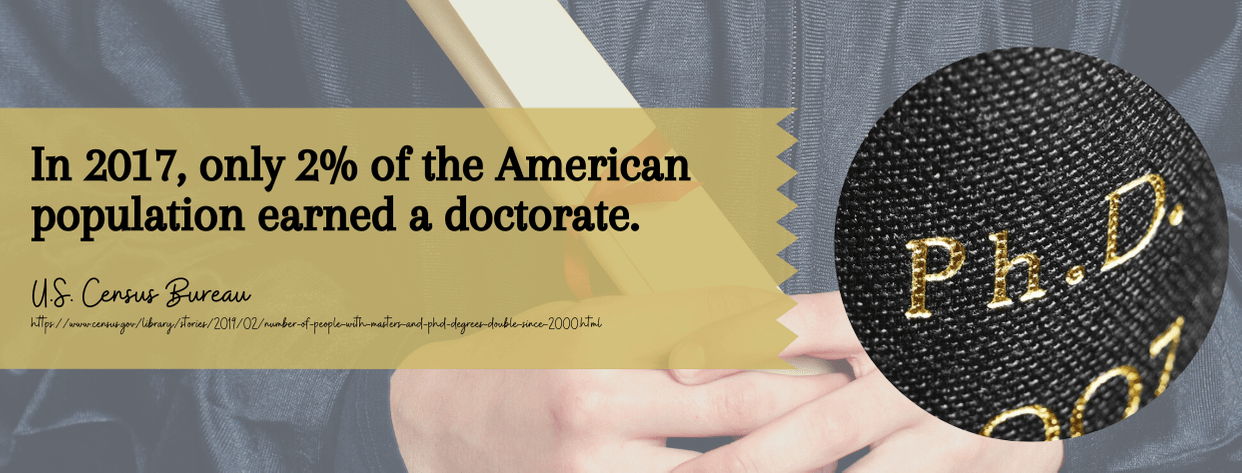
Academia is a glorious field, but the belief that a Ph.D. only prepares you for academia is a myth . Professors and instructors play an equally important role in the lives of their students as they charge towards achieving their academic goals.
If you want to earn tenure as a professor in a top-tier college or university, having a Ph.D. will significantly increase your odds of securing a position. However, even if you are not a member of academia, pursuing a Ph.D. degree is still a great investment that you should seriously consider.
If you have a passion for research, you can choose to become a scholar, if not a professor. Research is central to the pursuit of an advanced degree, especially a Ph.D. Doctorate holders who do not teach in a university or higher education institutions can focus on doing research. Researchers publish peer-reviewed papers that reach students, professors, and fellow researchers who share the same interest in their specific field.
Choosing a research-focused career over a tenured teaching job allows you to pursue intellectual interests outside the academe. With a chance to apply and win research grants, you will have the resources to do extraordinary things in your field.
Admission requirements may differ from one institution to another. Your admission to any of the Ph.D. programs will depend on your academic records, both at the bachelor’s and master’s levels. Most importantly, the admissions officer will evaluate your potential research capabilities.
In the United States, universities and higher academic institutions require that applicants hold an honors degree or a master’s degree equivalent. Aside from this, having high academic standing will increase your chances of getting into the top research institutions in the country.
The admissions office will also assess an applicant’s bachelor’s degree, and graduating at the top of your class will also boost your chances. But some institutions assess applications solely based on your master’s degree academic record.
Funding for your research may also be a deciding factor on your admission. If you depend on study or research grants and loans, you need to have an exceptional academic track record to impress the admission office. But, if you are self-funded, you may have a competitive advantage over other applicants who are dependent on grants.
You also need to find a tenured professor to serve as your advisor while you complete your Ph.D. before your chosen institution may admit you to the program.
Below are the standard requirements for admission:
- Transcript of records of both your undergraduate and graduate degrees
- Resume or curriculum vitae
- Recent Graduate Record Examinations (GRE) or Graduate Management Admission Test (GMAT) scores
- Letters of recommendation from your peers and mentors
- Statement of purpose
After successfully complying with the admission requirements of the Ph.D. program, you are now officially a Ph.D. student. You will begin your academic journey towards completing a three- or four-year research program. Postgraduate academic institutions serve as fertile research environments that breed future scientists and experts in different fields of study.
Ph.D. students are introduced to the world of independent research. Students study under the close supervision of an academic supervisor or advisor who has a tenured position as an associate professor or higher. As Ph.D. students, collaboration with your advisor is central to developing a valuable addition to the pool of literature in a given subject.
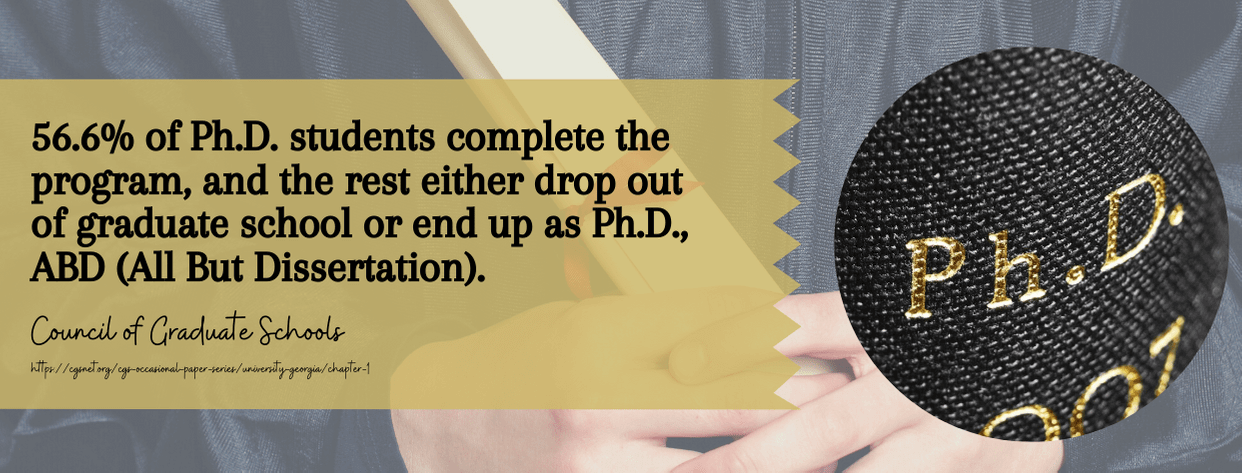
While in graduate school, your main focus is authoring original research, which involves data analysis and evaluation. Depending on your program and department, you may be given the leeway to formulate your area for your research.
However, there are Ph.D. programs that present their students with a selection of research proposals for you to choose from. These proposals are often formulated and peer-reviewed by program supervisors.
You can complete your proposal at a certain term, or year-round, depending on your university or academic institution. Ph.D. students are required to submit a statement or a proposal to be submitted at the end of the term. This will usually take up the first two years of your journey towards your doctor of philosophy degree.
Writing original research is, arguably, the ultimate goal of hundreds of thousands of Ph.D. students. This requirement may vary from one institution to another, or even between subjects.
A doctoral program develops a student’s field of specialty to sharpen their skills to advance their position in their industry. Some doctorate programs require students to attend classes and take examinations, while some require Ph.D. students to handle a teaching load or serve as research assistants.
In the early phases of your doctoral study, you will focus on your chosen field of study. Eventually, you will dive deeper into enhancing your understanding of your specialization to better prepare you for writing your dissertation. At this point, you will start writing your proposal in preparation for your oral defense before a panel of esteemed specialists in your field.
During the final years of graduate school, your dissertation should be your priority. This way, you can move forward with your degree and become a Ph.D. Candidate.
Becoming a Ph.D. candidate from being a Ph.D. student will take time, even more so, your utmost dedication. Before you can be considered a Ph.D. Candidate, you need to submit a minimum of twenty- to thirty-page paper at the end of your first year in graduate school.
Second, you must have completed at least two years of full-time coursework. You will also be asked to show how proficient you are in the research language. In some programs, you need to submit a grant application.
Then, you need to have a draft of your dissertation prospectus. At this point, your prospectus must include your literature review and methodology.
Most importantly, you need to successfully defend your proposal before a committee or panel of experts. Once the committee approves your proposal and you pass the qualifying exams, you can now refer to yourself as a Ph.D. candidate.
After getting approval for your dissertation proposal or prospectus from the panel, you can now refer to yourself as a Ph.D. candidate. This means you get the green light to start writing your dissertation. As a Ph.D. candidate, you can use Ph.D.(c) as part of your credentials.
It signifies that you have now advanced to candidacy. You have reached the final years of your doctoral study, which will be crucial in the trajectory of your academic career.
Aside from having to defend your proposal, some institutions also require Ph.D. candidates to pass a weeklong examination. This often involves three separate written exams that may last for seven hours. You must also pass an oral examination. In this exam, your supervisor, your advisor, and a panel can ask you questions that are related to your discipline.

Now that you are a Ph.D. candidate, you can now start working on your dissertation, but before you begin working, you should take a well-deserved rest.
Having reached your candidacy means you have finished your doctoral studies and can now focus on your research. Writing a research paper entails that you are knowledgeable in your chosen subject.
Reading related literature will better equip you in identifying the gaps in the literature. This way, you may be able to add new knowledge to the subject and through testing your hypothesis and gathering relevant data for your research. Data collection is one of the most critical parts of research, and the viability of your study depends on it.
Moving forward, the data you have collected needs to be processed or analyzed for you to draw up a conclusion. The entire process of writing your dissertation is tedious, so you need patience, dedication, and a passion for research.
As a Ph.D. candidate, you can now use a Ph.D.(c) as part of your credentials. It signifies that you have completed all of your coursework and have now advanced to candidacy.
The (c) means you are currently working on your dissertation. However, including this title in your credentials is inappropriate, even wrong. This designation is very often misused that it has become common among candidates.
First, because a candidacy does not equate to a degree, it is not a credential or a status that is awarded by any university, college, or higher education institution. Also, you can be a candidate for a considerably long time. Unfortunately, some Ph.D. candidates never comply with the dissertation requirement and progress to earning their Ph.D. degree.
In the world of postgraduate studies, they are called Ph.D., ABD, or “all but dissertation.” Unfortunately, according to the Council of Graduate Schools , 56.6% of Ph.D. students complete the program, and the rest either drop out of graduate school or end up as Ph.D., ABD.
The answer to this will depend on the path or subject you choose.
In 2017, the median completion period for completion of a doctorate program was 5.8 years according to the Survey of Earned Doctorates. Typically, a Ph.D. degree will take four to six years to complete, but several factors may prolong this period.
One factor is your field or discipline. Programs like humanities and arts take more than seven years based on the same survey.
Another factor is your academic background. Applying for a Ph.D. program typically requires that you have already completed your master’s degree. This means more time spent in graduate school.
Yes, there are academic institutions that offer professional doctorate degrees specifically designed to accommodate working professionals.
A professional doctorate is a Ph.D. equivalent that allows experienced professionals who aim to earn a doctorate. You can leverage their industry expertise through gaining an academic degree that translates to credibility, and influence in their field.
Students in the program often bring with them years of practical work experience and expertise in various areas, including information technology, business administration, finance, and education. This background will serve as the primary focus of your doctoral research. You can apply your first-hand experience and knowledge in solving real-world problems.
Similar to a Ph.D. degree, you will learn and develop your research methods, design your proposal, and present your findings through writing your doctoral study.
Yes, you can complete your Doctor of Philosophy degree fully online. Unsurprisingly, many Americans resolve to online education to earn a degree, especially an advanced or professional degree.
In a United Nations Study, the U.S. workforce is made up of 85% males and 67% females who are working beyond 40 hours per week. Individuals with family and other obligations are also usually drawn toward online doctorate programs.
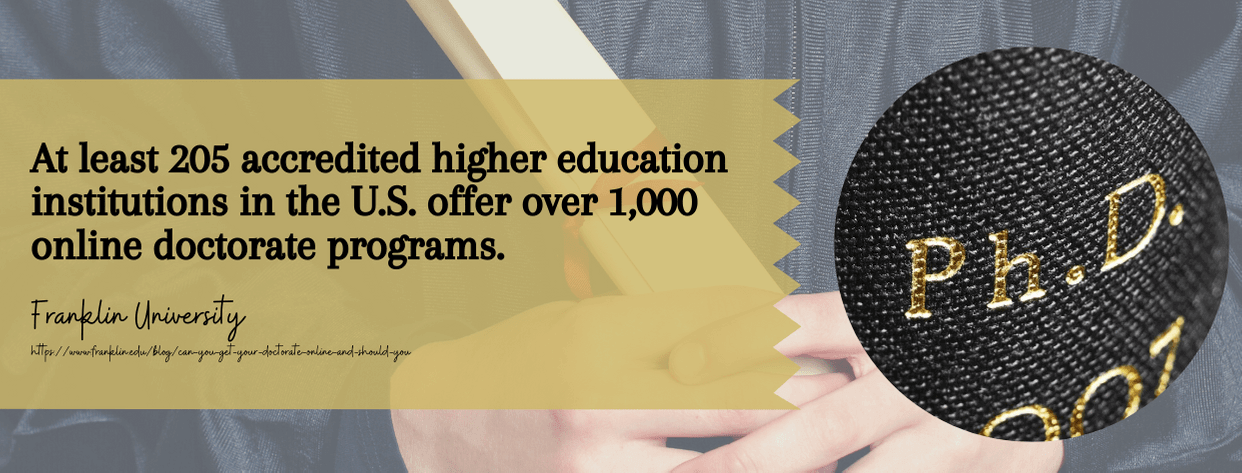
An online Ph.D. program is an attractive offering that more and more working professionals seek. Now, there are at least 205 accredited higher education institutions in the county that offer over 1,000 doctorate programs that can be completed online. Earning your Ph.D. online does not necessarily mean that it will be easy. It can easily be as demanding as the traditional format.
Most importantly, an online doctorate bears the same credibility as the one earned on-campus. It is advised that before you enroll in an online program, you check the accreditation of your college or university. This way, no time, money, or effort will be put to waste.
For additional information, check this out:
- Ph.D.’s That Pay: The 15 Highest-Paying Doctoral Degrees
- Hardest Grad School Interview Questions and Response Tips from Ph.D. Experts
Thank you for visiting nature.com. You are using a browser version with limited support for CSS. To obtain the best experience, we recommend you use a more up to date browser (or turn off compatibility mode in Internet Explorer). In the meantime, to ensure continued support, we are displaying the site without styles and JavaScript.
- View all journals
- Explore content
- About the journal
- Publish with us
- Sign up for alerts
- Recruiters and Academia
- Published: 10 May 2006
What makes a good PhD student?
- Georgia Chenevix-Trench 1
Nature volume 441 , page 252 ( 2006 ) Cite this article
23k Accesses
12 Citations
49 Altmetric
Metrics details
Some tips for PhD students.
Doing a PhD should be fun and rewarding, because you can spend all your working time discovering things and pursuing ideas — and getting paid for it, without any administrative responsibilities. Those who stick with a career in science do so because, despite the relatively poor pay, long hours and lack of security, it is all we want to do.
Unfortunately most new PhD students are ill-prepared, and as a consequence very few will fulfil their aspirations to be independent scientists. The main reasons for this are the 'grade creep' inherent at most universities, making it difficult to identify the really talented first-class graduates from the rest, and the pressure on universities to graduate as many PhD students as possible. The consequence is that we enrol far too many of them without telling them clearly what doing a doctorate should entail. We therefore set ourselves, and the students, on a path of frustration and disappointment.
So what should we be telling prospective PhD students?
Choose a supervisor whose work you admire and who is well supported by grants and departmental infrastructure.
Take responsibility for your project.
Work hard — long days all week and part of most weekends. If research is your passion this should be easy, and if it isn't, you are probably in the wrong field. Note who goes home with a full briefcase to work on at the end of the day. This is a cause of success, not a consequence.
Take some weekends off, and decent holidays, so you don't burn out.
Read the literature in your immediate area, both current and past, and around it. You can't possibly make an original contribution to the literature unless you know what is already there.
Plan your days and weeks carefully to dovetail experiments so that you have a minimum amount of downtime.
Keep a good lab book and write it up every day.
Be creative. Think about what you are doing and why, and look for better ways to go. Don't see your PhD as just a road map laid out by your supervisor.
Develop good writing skills: they will make your scientific career immeasurably easier.
To be successful you must be at least four of the following: smart, motivated, creative, hard-working, skilful and lucky. You can't depend on luck, so you had better focus on the others!
Author information
Authors and affiliations.
principal research fellow at the Queensland Institute of Medical Research, Royal Brisbane Hospital, Herston, Australia
Georgia Chenevix-Trench
You can also search for this author in PubMed Google Scholar
Additional information
→ http://www.qimr.edu.au/research/labs/georgiat/Guideforphds.doc
Related links
Related external links.
Guide for PhDs
Rights and permissions
Reprints and permissions
About this article
Cite this article.
Chenevix-Trench, G. What makes a good PhD student?. Nature 441 , 252 (2006). https://doi.org/10.1038/nj7090-252b
Download citation
Published : 10 May 2006
Issue Date : 11 May 2006
DOI : https://doi.org/10.1038/nj7090-252b
Share this article
Anyone you share the following link with will be able to read this content:
Sorry, a shareable link is not currently available for this article.
Provided by the Springer Nature SharedIt content-sharing initiative
This article is cited by
Look who's talking too: graduates developing skills through communication.
- Eleni M. Tomazou
- Gareth T. Powell
Nature Reviews Genetics (2007)
Quick links
- Explore articles by subject
- Guide to authors
- Editorial policies
Sign up for the Nature Briefing newsletter — what matters in science, free to your inbox daily.
You're viewing this site as a domestic an international student
You're a domestic student if you are:
- a citizen of Australia or New Zealand,
- an Australian permanent resident, or
- a holder of an Australian permanent humanitarian visa.
You're an international student if you are:
- intending to study on a student visa,
- not a citizen of Australia or New Zealand,
- not an Australian permanent resident, or
- a temporary resident (visa status) of Australia.

What makes a good PhD student?
Study tips Published 31 Mar, 2022 · 3-minute read
Thinking about pursuing a PhD but worried you might not excel in such a research-intensive program? We believe you can do it – especially if you cultivate some of the top traits of successful PhD candidates.
It takes a special type of person to spend countless hours researching and writing about a niche topic. While all our higher degree by research candidates have unique personalities and interest areas, there are some attributes they tend to have in common – traits that make them a “good” PhD student and help them on their path to completing their thesis.
Here we’ll look beyond just how to be a PhD student and instead talk about what makes a good PhD student. What skills, attitudes and behaviours can you develop or practise now to set yourself up for success in the next 3-4 years?
What do PhD programs look for?
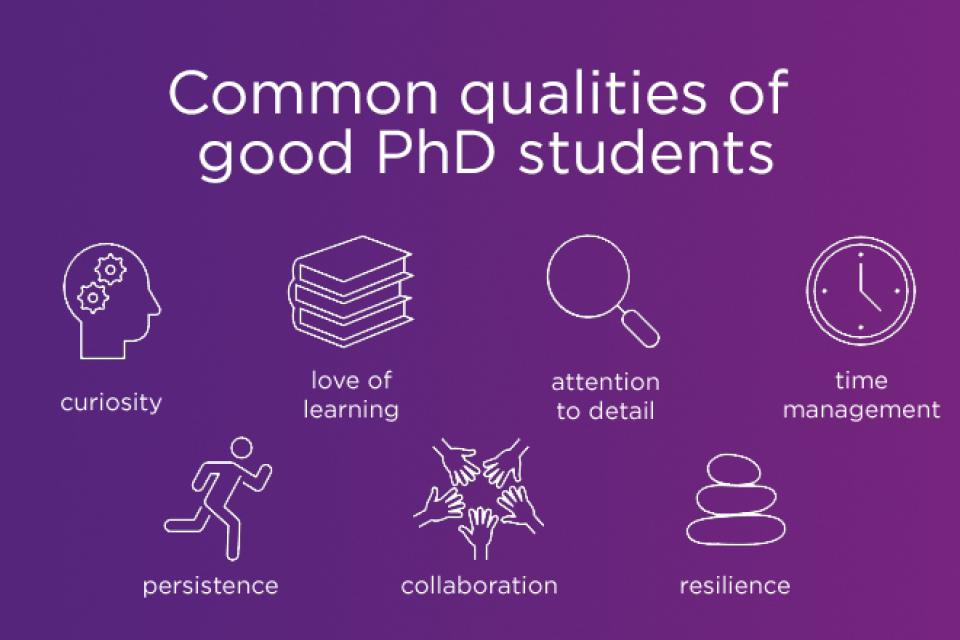
The criteria for getting a PhD scholarship provide some useful clues as to what makes a good PhD student in the eyes of an advisory board. In particular, you’ll benefit from having a strong academic record and proven abilities to conduct effective research . The academic transcript from your honours or postgraduate program can help demonstrate this.
More important, though, are the traits you developed in order to get those academic results:
- enduring curiosity and a love of learning
- conscientiousness and attention to detail
- organisational and time-management skills
- ability and willingness to collaborate with anyone
- persistence and resilience (pushing through challenges and bouncing back from failures)
- intrinsic motivation and self-discipline (the drive to set your own goals and follow them through).
To thrive in a PhD program, you’ll want to maintain and strengthen these attributes. The good news is anyone can practise or work on these traits to some extent, even if they don’t always come naturally to you.
Keep in mind that every candidate is different, so there’s no “correct” balance of the above attributes guaranteed to make you a good PhD student. On your research journey, you’ll quickly realise your existing strengths and any areas you might need to work on.

Some of the qualities that I find are key are being inquisitive, loving to learn and question the status quo, and being an independent and self-directed worker.
What makes a good PhD student: it isn’t a simple formula
We asked UQ PhD candidate Sarah Kendall for her advice on what makes a good PhD student. While she had some attributes to suggest, she also pointed out that candidates bring unique strengths and skillsets to their research – and this is something that can’t be quantified.
“Good PhD candidates can have many different qualities,” says Sarah.
“Some of the qualities that I find are key are being inquisitive, loving to learn and question the status quo, and being an independent and self-directed worker.”
Sarah acknowledges that some of these factors are inherent for some people more than others. But she’s also quick to remind us that completing research in a previous program can help you identify if you’ve got what it takes.
“Doing something like an honours project can definitely help you figure out whether these are qualities you have, as well as to prepare you for the kinds of behaviours you’ll need as a PhD candidate.”
Chelsea Janke, another UQ PhD candidate, adds the following behaviours and qualities to the list of what PhD programs look for:
- ability and interest to learn
- critical thinking
- problem solving
- resourcefulness
- resilience.
So, if you’re wondering how to be a PhD student, there’s clearly no one-size-fits-all answer. But if you possess a healthy combination of some of the attributes discussed above, there’s a good chance you’ll fit the bill.
Does this sound like you (or at least someone you’d like to be with some practice)? We’d love to have you contributing to the groundbreaking research projects here at The University of Queensland.
Learn more about doing a PhD at UQ
Share this Facebook Twitter LinkedIn Email
Related stories

Is a PhD worth it?
9-minute read

What makes a good PhD supervisor?

Tips for PhD students from Samantha and Glenn
7-minute read

How to get a PhD scholarship or funding
3-minute read
Clearing Universities & Courses
Clearing advice.
Recommended Clearing Universities
Popular Course Categories

Course Search & Discover
Start the search for your uni. Filter from hundreds of universities based on your preferences.
Search by Type
Search by region.
Recommended Universities

Ravensbourne University London
London (Greater) · 88% Recommended

Swansea University
Wales · 100% Recommended

University of Surrey
South East England · 98% Recommended
Search Open Days
What's new at Uni Compare

Bangor University
Transform lives with a Health and Social Care Degree from Bangor

University of Sussex
Prepare for a digitally advanced workplace with cutting edge Finance Degrees
Ranking Categories
Regional rankings.
More Rankings

Top 100 Universities
Taken from 65,000+ data points from students attending university to help future generations

About our Rankings
Discover university rankings devised from data collected from current students.
Guide Categories
Advice categories, recommended articles, popular statement examples, not sure what to search for, take our quick degree quiz.
Find the ideal uni course for you with our Course Degree Quiz. Get answers in minutes!
Take our full degree quiz
Get more tailored course suggestions with our full Course Degree Quiz and apply with confidence.
PhD Students
The PhD is a long-standing UK qualification and has been part of the fabric of UK universities for as long as higher education has been around.

How do PhD students cope with the stresses of PhD qualifications and how many papers should a PhD student publish?

What is a PhD student?
A PhD research student takes on a project focusing on a particular topic. They will zone in on a research hypothesis, explore it and write up the results. Once they complete this they obtain a Doctor of Philosophy degree - which is the highest level of higher education.
A PhD research student will spend between three to seven years - full or part-time - completing their thesis which will add value to the research world in their chosen subject.
What does a PhD student do?
So, what do you do as a PhD student? Doctorate students work on a research project or hypothesis for several years, completing a large piece of work that is original in that subject area. The thesis will provide new research and insight in its contribution to that field.
Other than completing their huge thesis, a PhD student could be teaching, with many teaching or working as assistants within their department at university. Some institutions expect their PhD students to do this, whilst others offer it as an optional extra. You could find yourself assisting with lectures or tutorials and helping with supervising undergraduates.
Most PhD students are still full-time students, they are often passionate and engrossed in their particular field and work part time jobs whilst completing their degree.
But if you’re wondering how many papers does a PhD student publish? It’s typically their thesis that is completed in the end, but this could change after their doctorate, as many continue in the academic field.
However, regarding how many papers should a PhD student read? This is entirely down to the individual learner, although it’ll most likely be hundreds. A thesis can be 80,00-100,000 words, and the amount of research needed is substantial, much more than the 12,000 word Master’s dissertation. This is why it takes so long to complete.
What is it like to be a PhD student?
The life of a PhD student will vary for each person but the foundations will be the same; studying, working, and research.
PhD student life is full of papers, reading and analysing, as well as researching their own topic. It may include lectures and seminars that they teach as part of their Doctorate, it might involve a part time job they do on weekends, but every PhD student’s day-to-day life can differ.
Some may document their journey through a PhD student blog, whilst others may still live at home, much like individuals in any area of life, they’re all unique.
Working towards a doctorate is a lengthy and intense process - but it offers huge rewards. The average age of a PhD student in the UK is usually someone in their 30s. PhD’s expect their students to have a Master’s and undergraduate degree which take some time to complete. Further, most PhD’s cost a lot if you can’t secure funding so this may take time-saving up for. Because of all of this PhD students can range from 22-years-old to 60 - the possibilities are endless.

What makes a good PhD student?
There isn’t an essential checklist to being a good PhD student, but there are several things you can do to ensure you keep yourself on track.
Strong time management is one of the vital parts of studying for a Doctorate. Treat it as a full time job and set enough time aside each day to work on it, it’s a long and difficult process that can be broken down into pieces and seem more manageable. This will help when you’re writing your thesis, as all the time and effort you’ve put into it will start showing, as well as providing experiences of working to a schedule. Although you should put a lot of time into your work, it’s just as important to enjoy life, socialise and allow yourself ‘down time’.
Don’t send large pieces of work to your supervisor - they also have large workloads - instead, send short submissions regularly to receive constructive and helpful feedback. This will be more productive as you’ll have the chance to assess the points highlighted instead of having less support on huge pieces of work that are thousands and thousands of words.
It’s fine if other areas of life are taking up too much of your time, like teaching, being a student representative, or work and life commitments. If this is the case address the situation maturely and calculate how much time you can give and what you need to realign. It may be that you work fewer hours or you stop going out three times a week.
Your PhD degree or other areas in your life should work in a balance. For example, how many hours should a PhD student work? This is down to you and how much you have to get through each day and week.
How to manage your time as a PhD student?
For any prospective PhD student, the average week can depend on a number of factors; your learning style; the subject area; work patterns and facilities like lab access; what stage you are at for your PhD; what you have agreed with your supervisor; personal preference for working patterns and the university’s regulations.
Some students can work between 25 to 70 hours a week - depending on all of their commitments. Completing a doctorate is hard work and the individual areas of the thesis require different demands on your time. Peer pressure and overbearing supervisors may contribute to feeling like it’s taking up a large part of your life, but address each issue as it comes along and it won’t feel so uncomfortable or that it’s ‘too much work’.
It’s important to remember that your supervisor and university want you to complete a successful PhD and they are essentially supporting you - they want you to come out with something amazing!
For a lot of people, finishing a PhD degree is a huge academic achievement, as it’s the final product of several years of commitment, higher education, and the earned right of being specialised in your topic.
Who can supervise a PhD student?
A strong and positive student-supervisor relationship is vital to the success of your degree. Supervisors are appointed to supervise any work you do.
Supervisors are friendly enough people, but if you feel you need to work on your relationship, be honest about it with them - you’ll be with them for several years! And the final resort is changing your supervisor by speaking to the department and university, however, this is an extreme circumstance that most PhD students don’t need to do.

How much does a PhD student earn in UK?
This is down to how much the university pays it’s PhD students for working at their establishment as a lecturer or in student support. The PhD student salary for UK universities can vary, so it’s worth checking before applying to study for a doctorate at that establishment. Not all universities require their PhD students to work whilst they study, if this is the case, you won’t get a ‘salary’ but may receive financial support for living costs and tuition fees.
Next, there are many different types of PhD student jobs available outside the university grounds. University towns or cities usually have higher retail and restaurants available, because of the student life and atmosphere in general. These are great at offering more flexible hours, including evenings and weekends, which can be perfect for your research.
However, a PhD student salary is something that can’t be calculated as an average, as it’s down to the individual and how much they are working.
How much does it cost to fund a PhD student?
This is an important question if you live at home, with parents, with a partner or even on your own. There is PhD loan student finance in the form or PhD studentships or scholarships from universities, research councils and charities. There is also a PhD student loan provided by the government which you end up paying back via your earnings afterwards.
Securing funding can be a major worry for a lot of PhD students as it costs a pretty penny to complete the doctorate. However, there are lots in place to aid those who are embarking on the journey. For example, PhD student council tax is free, meaning students don’t have to pay council tax. If you are living with one other person who isn’t a student, they can apply for 25% off of their bill, as they’re seen the same as a single person living in the accommodation. But this isn’t in place for a full household (unless you’re all students!). Additionally, as soon as you submit your PhD you must start paying your council tax.
Next, as a lot of PhD students are mature or at an older age than the typical student population, some may be interested in buying a home with a partner, friend or even on their own. Because of this, many wonder about PhD student mortgage options. A mortgage is a contract with the bank on a property, where the bank or building society will buy the property, and you pay back what you owe in mortgage repayments every month. It isn’t the easiest thing to secure, and if you’re studying for a PhD you should work out if you can afford to apply for a mortgage before going ahead with either. Doctorate students don’t earn a high salary, as they are studying and working around their research project.
However, it could be a viable option following the completion of your PhD and once you secure a job. For international student PhD funding in UK, it can differ as most universities offer places to those living in the UK. It doesn’t mean there aren’t options out there, as some institutions have clauses they can work around to offer PhD studentships or scholarships to international students.
It’s worth checking with your chosen universities to find out if they provide funding to international students before applying.

Are there student loans for PhD programs?
The student loan game is changing in the UK and the government now offers a PhD student loan. The student finance PhD loan offers up to £25,000 for those wanting to become an academic doctor. The amount you receive is not based on you or your family’s income and is not means-tested.
However, for anyone looking into PhD funding student finance options they should know the Department for Work and Pensions (DWP) may take your loan into account when working out any benefits you receive, if you’re applying for Universal Credit, as an example.
The PhD student loan is paid directly to you and you can use it for your fees and living costs, and it’ll be divided equally across each year of your course.
You can also apply for it in any year of your degree, but if you apply after your first year you might not get the maximum amount, as it’s goal is to support PhD students throughout the entire doctorate. If you apply after the first 12 months you might receive around £10,906 per year.
What is the difference between PhD student and candidate?
So, what’s the difference between PhD student and PhD candidate? They are actually separate things with a thesis or final exam in the way. It works similar to a postgraduate diploma and a Master’s degree, where people are awarded the diploma if they don’t complete or choose to do the dissertation at the end.
A candidate is someone who has fulfilled all the requirements for the PhD degree except the thesis. This could also be an option for anyone who needs a break - PhDs are a long and difficult process!
Some institutions allow you to become a Candidate of Philosophy instead, or grant a Master’s degree en route to the doctoral degree. It can also be referred to as PhD ABD, which means ‘All but Dissertation’.
In theory, everyone is a PhD candidate or student until they submit their project or thesis, but the title has to be awarded by the university if you choose to take a break or not to finish your final dissertation. Not all universities offer the option of becoming a PhD candidate, so if you’re having troubles during your doctorate talk to your supervisor as the first port of call.
How to make money as a PhD student?
Funding a PhD can be tough - but it’s not impossible. Many choose to take on part time jobs, either at the university or outside. First, most PhD student employment status is someone who is working - as the rent and living costs aren’t going to pay for themselves!
If you need to make money, look at writing your CV as a PhD student. You’ll need to apply for jobs that’ll offer hours that can work around your schedule. A PhD student CV doesn’t need to go into detail about your doctorate or research if you’re looking to work in the retail, food or warehouse sector.
Set up your CV like you would for any job opportunities you regularly would, input your greatest achievements and set it out smartly and clearly. Then you can apply for jobs that suit your needs and ability.
How to write a reference letter for a PhD student?
When PhD students are applying for their course via a Research Council or university they will usually write a proposal. This may include a reference letter, or a recommendation letter for a PhD student from a professor they’ve worked with before. They allow the panel or admissions department to discover why they should offer a place to that individual.
When you are looking to fill out your proposal, you should seek a letter from someone who has seen your hardwork and who is able to sing your praises - because you want to show the best side of you!
If you’re writing a reference for a PhD student, focus on the good things they’ve done, especially within the academic and research field. A PhD student needs to be focussed, committed, dedicated and hardworking, as well as holding many other great attributes.
postgraduate Universities
Postgraduate uni's.

Cranfield Uni
117 courses

Northumbria Uni
385 courses

129 courses
Want to learn more about a university?
Get your questions answered by sending them an enquiry now.

PhD Student vs Graduate Student [Correct terminologies]
As you progress down the academic pathway it can become confusing to work out what the appropriate terminology is for your current level of education. Is it PhD student? Is it graduate student? Is the PhD student the same as a graduate? Well, this article will answer all your questions.
Graduate student is an umbrella term for someone with an undergraduate qualification (bachelors, diploma), they are often performing graduate research in a Masters or PhD program. All PhD students are graduate students but not all graduate students are PhD students.
To fully get our heads around each of these definitions, we need to understand exactly what each term really means.
This is where we can look at the actual definitions of PhD student vs graduate student.

Definition of PhD student
A PhD student is someone who is currently enrolled in a doctorate degree program and is in the early stages of their course.
Some institutions require students to undergo a coursework component of their graduate program and are called a PhD student.
After the completion of the coursework component, with the research component still to go, they can be called a PhD candidate .
Definition of Graduate student
A graduate student is a known for a student who continues their studies after completion of their undergraduate degree.
The Cambridge dictionary defines it as:
A student who is studying for a degree that is higher than the one received after four years of study at a college or university.
Who is considered a graduate student?
Graduate students can include:
- Masters students
- PhD students
- Professional Masters
- Graduate academic certificate programs
- undergraduate/graduate hybrid degree programs
Even if you have got an undergraduate degree, there are many more options for you to obtain many more qualifications and build on your education. In these instances, you will be known as a graduate student.
Is a PhD student a graduate student?
Yes, a PhD student is a graduate student.
They have spent up to 4 years in their undergraduate programs in order to qualify for admission into a PhD program.
PhD students are able to call themselves graduate students but many choose to refer to themselves as PhD students or candidates.
Is PhD the same as graduate?
A PhD is the highest education attainable as a graduate.
In order to obtain a PhD one must graduate from an undergraduate degree. From the moment of graduating in their undergraduate degree they are known as a graduate.
The order of becoming a PhD from a graduate is shown in the table below. It also includes what happens after you get a PhD.
Is a doctoral student the same as a PhD student?
Strictly speaking, a PhD student is someone who is pursuing a doctor of philosophy.
A PhD student is a type of doctoral student but not all doctoral students are PhD students. Anyone aiming to achieve the title of ‘Dr’ is a doctoral student.
There are many other different types of doctoral students including:
- Doctor of Arts (DA)
- Doctor of Business Administration (DBA)
- Doctor of Design (DDes)
- Doctor of Engineering or Engineering Science (DEng, DESc, DES)
- Doctor of Education (EdD)
- Doctor of Fine Arts (DFA.)
- Doctor of Juridical Science (JSD, SJD)
- Doctor of Musical Arts (DMA)
- Doctor of Music Education (DME)
- Doctor of Modern Languages (DML)
- Doctor of Nursing Science (DNSc)
- Doctor of Philosophy (PhD)
- Doctor of Public Health (DPH)
- Doctor of Sacred Theology (STD)
- Doctor of Science (DSc, ScD)
- Doctor of Theology (ThD)
There are also professional degrees that lead to the person being called Doctor. These professional degrees result in honorific doctor titles, including those found in the table below.
In my 15 years in academia, I would only really refer to someone as a PhD student. However, if someone was to introduce themselves as a doctoral student I would understand them to be a PhD student.
Wrapping up
In this article, we have learned the difference between PhD student vs graduate student.
In summary, a graduate student is an umbrella term that includes anyone that has done an undergraduate qualification and is continuing their education. It includes Masters students, PhD students and others.
All PhD students are graduate students but not all graduate students are PhD students.

Dr Andrew Stapleton has a Masters and PhD in Chemistry from the UK and Australia. He has many years of research experience and has worked as a Postdoctoral Fellow and Associate at a number of Universities. Although having secured funding for his own research, he left academia to help others with his YouTube channel all about the inner workings of academia and how to make it work for you.
Thank you for visiting Academia Insider.
We are here to help you navigate Academia as painlessly as possible. We are supported by our readers and by visiting you are helping us earn a small amount through ads and affiliate revenue - Thank you!

2024 © Academia Insider

Cornell Chronicle
- Architecture & Design
- Arts & Humanities
- Business, Economics & Entrepreneurship
- Computing & Information Sciences
- Energy, Environment & Sustainability
- Food & Agriculture
- Global Reach
- Health, Nutrition & Medicine
- Law, Government & Public Policy
- Life Sciences & Veterinary Medicine
- Physical Sciences & Engineering
- Social & Behavioral Sciences
- Coronavirus
- News & Events
- Public Engagement
- New York City
- Photos of the Week
- Big Red Sports
- Freedom of Expression
- Student Life
- University Statements
Around Cornell
- All Stories
- In the News
- Expert Quotes
- Cornellians
News directly from Cornell's colleges and centers
Twelve doctoral candidates lobby on Capitol Hill
By katya hrichak.
Twelve doctoral candidates traveled from the Ithaca campus and Weill Cornell Medicine in New York City to Capitol Hill April 17 for the annual Cornell Ph.D. Student Advocacy Day.
Students engaged in meetings with members of Congress and their staffs to discuss how federal funding impacted their ability to access graduate education and advance their doctoral research. They also met with Graduate School alumni and others with experience working as policy fellows with various agencies and organizations.
Read more on the Graduate School website .
Media Contact
Media relations office.
Get Cornell news delivered right to your inbox.
You might also like

Gallery Heading
- Graduate School
- Student Life

GPSS Officer Candidates – 2024 Elections
The gpss elections for officers 2024-25 will be on wednesday, may 8 at 5:30 p.m. in hub 332., president (0), vice president of internal affairs (1).
Kana Saarni
Resume | Statement of Objectives
Vice President of External Affairs (1)
Mykhail Lembke
Vice President of Finance (0)
Vice president of equity and inclusion (3).
Avery Clare
Vice President of Administration (2)
The Elections Committee has also created the following documents as supplemental:
- 2024-2025 GPSS Voter’s Guide
- 2024-2025 GPSS Elections FAQ
- 2024-2025 Complaint Guidance
Please submit all questions or concerns about the elections process to the Elections Committee Chair, [email protected] . Please do NOT contact the GPSS Office regarding elections procedures; you will be referred to the Elections Committee.
● Sunday, May 5, 2024, 5:30 p.m. – Last day to file a nomination with the Elections Committee Chair and have a candidate’s information published on the GPSS website. In order for candidates to have their information published on the website, candidates must declare which office they are running for and certify that they meet the qualifications to run at this time. Late nominations are accepted as outlined in the Bylaws, but candidate materials will not be guaranteed to be posted to the website if received later than May 5, 2024.
● Wednesday, May 1, 2024, 5:30 p.m. – Any initial Officer candidates’ information will be emailed to Senators. Candidate information received after this date will be dispersed to the Senate before the election via email as long as it is received 72 hours (Sunday, May 5, 2024, 5:30 p.m.) before the Officer Election Meeting.
● Monday, May 6, 2024, 5:30 p.m. – All available Officer candidates’ information will be emailed to Senators. Candidate information received after this deadline will not be dispersed.
● Monday, May 6, 2024, 5:30 p.m. – Last day to file challenges to the impartiality of the independent witnesses.
● Wednesday, May 8, 2024, 5:30 p.m. in HUB 332/Zoom – GPSS 2024-2025 Officer Elections
● Wednesday, May 8, 2024 – Digital ballots will be made available online by the GPSS Elections Committee. All candidates must attend the Officer Elections meeting in person or via online conference mechanisms. Candidates will be given 3 minutes to speak and may present up to one PowerPoint slide detailing their positions and experience. If presenting a slide, it must be submitted to the Elections Committee ( [email protected] ) by email no later than 2:30 p.m. on May 6, 2024. After all the candidates for a given position have presented, there will be a 10-minute period for Senators to ask questions of those candidates.
The election results will be announced after the voting window has closed and after the Elections Committee and the two independent witnesses have analyzed the results (within seven (7) days of the Officer Elections Meeting). Any preliminary results will be announced at the end of the Officer Elections Meeting should any preliminary results be final.
● Saturday, May 11, 2024 – Last day to file challenges to the election. Challenges to the election must occur within 72 hours of the election meeting. All challenges must be submitted to the Elections Committee in a written form (preferably via email to [email protected] ). Complaints will initially be adjudicated by the Elections Committee, and if necessary, by the Judicial Committee.
Doctoral student solves tough puzzles
May 15, 2024
By Brennan Doherty, University Communications
A trip to Jordan as an undergraduate showed Carolina doctoral student Mark Radin the importance of water in international development.
“The story was basically, ‘Oh, we would do this, but we don’t have water. We would do that, but we don’t have water,’” he said.
As Radin, who grew up in New York City, continued his studies, he became interested in a related but tougher sell: sanitation and hygiene.
“The puzzle of it is much more complex than the water situation,” said Radin, a member of Carolina’s Royster Society of Fellows. “You have to convince people to change their habits and culture to adapt.”
Solving that puzzle is what brought Radin to the UNC Gillings School of Global Public Health, where he will graduate with a doctorate in environmental sciences and engineering.
“If you look at the professors who work on water, sanitation and hygiene — in the international space in particular — most of them are either at UNC or went to UNC,” said Radin, who previously worked in China and Kenya with the Jane Goodall Institute and the World Bank, respectively.
The classes he’s taken and research he’s conducted as a Tar Heel will help him with complex challenges such as improving menstrual hygiene in Kenya and creating sanitation solutions in Cambodia, where some people live in floating communities.
Those are two projects Radin is managing through his full-time work as a senior water, sanitation and hygiene specialist at RTI International, a nonprofit research institute based in Research Triangle Park.
“It’s pretty complex, but this is fascinating to me,” Radin said. “It’s applying my interest in puzzles and my intellectual curiosity to a thing that had positive outcomes — or ideally positive outcomes.”
Solving a different type of puzzle
Radin’s time as a Tar Heel has not been without difficulty.
When he returned from a trip to Haiti in May 2017, he noticed an itchy bump on his neck. At first, it was diagnosed as a bug bite, but an ultrasound later revealed that Radin had thyroid cancer.
“Most thyroid cancers are not visible,” Radin said.
Within a month, he had surgery through UNC Health to remove his thyroid completely, which kept him in the hospital for a week.
But Radin’s recovery was relatively swift. While he needed to drop a summer class, he was ready for the start of the fall semester. He still underwent radioactive iodine treatment and received thyroid hormones but felt everyone at Carolina was helpful as he resumed his studies.
“Understanding your energy level takes a long time. I definitely made sure all my professors knew, and they were all accommodating,” Radin said.
He’s also grateful for the support he received from the Royster Fellows program.
“They were helpful the whole time,” Radin said. “I think one thing that I wish fellows knew more is they have more services and are willing to assist more than people fully take advantage of.”
Best of both worlds
While Radin is already fulfilled by his current work, he’s excited by how his professional opportunities could expand with his doctorate.
His employer, RTI International, has a “heritage of academia,” he said. One example is the RTI Fellow Program, which allows employees to conduct their own research.
“This would allow me to get to that path, which is very much with my vision of straddling this practitioner/academic world,” Radin said. “It’s been very lucky.”
Contact the UNC Gillings School of Global Public Health communications team at [email protected] .
Use this form to submit news, events and announcements to be shared via our newsletter and digital screens.
View and download the visual elements associated with the Gillings School.
For the use of our faculty, staff and students, the School offers the following PowerPoint template, which can be modified as needed.
This form allows faculty and staff to create a new web profile or update a current one.
This form enables Gillings School representatives to submit requests for website edits.
Carolina Alumni Association honors Southerland and Koch
Information for:.
Sutton receives Department of Energy award to study improved hydrogeological modeling

Geoscience PhD candidate Collin Sutton has received the Department of Energy’s Office of Science Graduate Student Research Award, which will take him to Los Alamos National Laboratory later this summer to continue the work he’s done as a graduate student at UW–Madison.
Sutton specializes in hydrogeology, a field that studies underground water and other fluids. Specifically, his research looks at how fluids flow and transport other materials, like small particles or dissolved solutes, in fractures or breaks in the materials that make up the Earth.
Fractures may occur naturally, or they can be made by humans for oil and gas extraction, enhancing geothermal capabilities, producing better drinking water, and other purposes. But Sutton said that experts still don’t fully understand how fractures transmit water, especially when it comes to the mathematical models that researchers and companies use to predict how a system of fractures will work.
While mathematical models do exist, they often aren’t easy or quick to apply to a system. Sutton’s work with his advisor Chris Zahasky, assistant professor of geoscience, focuses on this problem.
“Let’s say you’re a company. It might not be realistic to run a model that takes a week or two, and you may not have the national lab resources and the computers that can do that. So, trying to figure out ways to make faster models that are useful to industry, academia, stakeholders, [and] regulators is useful,” he said. “There’s still this broad need for more understanding of how these [fracture networks] work physically, both in the lab and also how to make mathematical models that are capable and efficient enough that real people want to use it.”

Sutton is excited to work with a group at Los Alamos National Laboratory that has created a modeling framework for fractured networks. His dissertation work on how fluids move through fractures has been conducted at the lab scale, which uses smaller rock samples that can fit into the scanners he uses to study them. As part of this, Sutton has developed a flow and transport model that can explain what happens in the lab accurately.
“We’ve shown that this approach works at the lab scale, but we really need to scale it up,” he said.
Earning the Department of Energy research award to work with Los Alamos National Laboratory will help Sutton do just that. He will work with advisor Jeffrey Hyman to learn more about how the Los Alamos team does their modeling, then use those theories to approach his own research, perhaps creating a hybrid model between his work and that of the Los Alamos team.
“The hope is that you can combine the two and this actually does work at a larger scale, and it works very well,” he said.
Sutton studied geology as an undergraduate at the University of Tennessee at Martin, then earned a master’s from Auburn University specializing in hydrogeology. While he wanted to continue doing research after his master’s, he also wanted to see what it was like to work in hydrogeology professionally.
After working for two years in environmental consulting, Sutton’s interest in returning to research got stronger. His professional experience led him to realize there were a lot of topics in hydrogeology that no one fully understands.
“There’s this need for people who understand hydrogeology and also want to do research, because there’s a very human-level application to this, where learning more and having people trying to push the boundaries is important for all of us,” Sutton said.
Sutton expressed thanks to the mentors, professors, UW–Madison geology graduate students, and the wider community who have helped him along his journey to where he is now. In the long term, he hopes this work will lead to better modeling that can accurately predict fracture networks, which could help environmental companies better know how quickly and where a contaminant might move if it gets into a fracture network.

“My goal with this is that we can upscale it in a way that enables industry or regulators to be able to model fractures in a way that’s quick and efficient, but also gives them enough detail and enough guarantee that we’re pretty good with how we can predict what’s happening in fractures,” he said.
Sutton said he is excited for his time at Los Alamos National Laboratory – although he is also sad to leave Madison for those months – and sees the experience as a key piece of his academic and professional development experience.
“I get to network with people who are really industry-leading, academic-leading people in this field of fracture network modeling,” he said. “For me, it’s very much the next step of, okay, I’ve done this at UW at the lab scale, can I grow my professional or academic skillset to go up to this next level?”
Chemical and Biological Engineering PhD student Seth Anderson also received the Department of Energy Office of Science Graduate Student Research Award. Read more about Anderson’s research from the College of Engineering .
- Facebook Logo
- Twitter Logo
- Linkedin Logo
School of Human Resources and Labor Relations College of Social Science
School of human resources and labor relations phd candidate uriel saldivar receives the college of social science graduate student teaching award.

HRLR PhD candidate, Uriel Saldivar.
Uriel is a published researcher with interests in leadership, negotiated work arrangements, and remote work. He aspires to become a research professor in management upon completing his PhD. Uriel teaches HRLR 315, Research Methods and Analysis; HRLR 211, Introduction to Organizational Leadership; and HRLR 212, Career Management.
The Graduate Student Teaching Award recognizes a graduate student who has demonstrated evidence of dedication to instruction through experimentation and successful implementation of innovative techniques and/or contribution to the scholarship of teaching and learning, including experiential learning; and evidence of excellence in instruction as demonstrated by the impact on students' careers and colleagues' teaching/advising practices.
Uriel's PhD advisor Dr. Chenwei Liao noted, "As a first-generation college student, Uriel values the transformative power of education and integrates this perspective into his teaching to promote diversity, equity, and inclusion in his classes. His dynamic teaching style captures students' attention, while his openness encourages active participation from students of all backgrounds, fostering an inclusive and supportive learning community. Thanks to his outstanding teaching, students often remark that they completely forgot he was a first-time professor due to his exceptional teaching skills."
His students describe Uriel as an engaging, compassionate, and inspiring instructor who is focused on building authentic relationships and helping students learn. "Uriel is an empathetic instructor and is willing to offer support when students are in need. He wants students to learn the material of the course in ways that are applicable to their careers, not just for exams. His classroom is an inclusive space for all to explore their identities as a leader and as a future human resources professional," shared student Maura L.
"Besides research, teaching has also been a rewarding aspect of my doctoral journey in the School of Human Resources & Labor Relations at MSU. The CSS graduate student teaching award only further motivates me to continue serving our students to the best of my ability. I would like to thank everyone involved in this award nomination and the College of Social Science for this opportunity," said Uriel.
Uriel Saldivar's achievement exemplifies the high caliber of education within the College of Social Science, and we look forward to seeing how he will continue to shape the field of management and human resources in the years to come.
HRLR News & Events
Doctoral Oral Exams for May 27, 2024 – May 31, 2024
The Graduate Dean invites all graduate faculty to attend the final oral examinations for the doctoral candidates scheduled as follows:
Paulina Ochoa-Figueroa , PhD., Hispanic Literature and Linguistics Wednesday, May 29, 2024, 11:00AM, Herter Hall 017 Dissertation: “Translation as an Activist Effort in Women’s Writing from the Early Twentieth Century to the Present: The Literary Production of Victoria Kent, Aurora Correa, and Valeria Luiselli.” Regina Galasso, Chair.
Trina Harmon , PhD., Psychology Wednesday, May 29, 2024, 9:30AM, Tobin Hall 423 and via Zoom Dissertation: “Parents’ Expectations, Rules and Management Strategies for Children’s Mobile Device Use.” David Arnold, Chair.
Stephen Rondthaler , PhD., Chemical Engineering Wednesday, May 29, 2024, 1:00PM, Life Science Laboratories N610 and via Zoom Dissertation: “A Targeted genome-wide Approach to Elucidate and Control Bacterial Adhesion to Physiochemically Diverse Biomaterials.” Lauren Andrews, Chair.
Zimo Chai , PhD., Computer Science Thursday, May 30, 2024, 10:00AM, via Zoom Dissertation: “Tracking, Exposing, and Understanding the Network Middleboxes.” Amir Houmansadr, Chair.
Global footer
- ©2024 University of Massachusetts Amherst
- Site policies
- Non-discrimination notice
- Accessibility
- Terms of use

IMAGES
VIDEO
COMMENTS
PhD Candidate vs Student: 6 Key Differences. There are a number of key differences between a PhD student vs PhD candidate, from their status to the structure and nature of study. Note: Some universities have recently started adopting hybrid approaches (where there is no clear difference between PhD students and PhD candidates). These programs ...
A PhD student is different from a PhD candidate in that the student is still working through the coursework. They have not yet begun the dissertation process or passed the qualifying exams. A PhD student may also be in the process of taking the qualifying exams, but not yet finished with them. Many people believe that earning a doctorate degree ...
A PhD student is in the initial stages of their program, actively engaging in coursework, research, and academic requirements. On the other hand, a PhD candidate has advanced beyond coursework, passed comprehensive exams, and is focused primarily on independent research and the completion of their dissertation.
PhD Candidate vs PhD Student. 郑文强 . 清华大学 电气工程博士. 突然发现好久没写东西了,写一篇随笔吧。. 这几日实验室的师弟师妹们在准备系里的博资考,大家聊起来,说过了博资考,以后就可以把简历里的PhD Student改成光荣的PhD Candidate了。. 一听这个我顿时觉得 ...
A doctoral student is an individual who's been accepted into a doctoral program and is working through classes and coursework. A doctoral candidate has completed the coursework portion of a doctoral program and is focused on writing a dissertation or equivalent project. Other doctoral programs include MDs, JDs, ODs, DCs and AudDs.
A candidate is someone who has fulfilled all the requirements for the degree except the dissertation. I'm a historian (see my earlier post about being a humanist at MIT ), so my path to candidacy differs a bit from other doctoral tracks at MIT. But whatever the discipline, the transition from student to candidate is an arduous process.
Published on: June 14, 2023. Welcome to this comprehensive article on understanding the real difference between a PhD student and a PhD candidate. Both terms denote stages in a doctoral journey, but they imply different responsibilities, expectations, and milestones. A PhD student is in the initial stages of their doctoral journey, undertaking ...
Here in the U.S., a "Ph.D. Candidate" is a student who has completed all of the academic requirements for their degree, except their dissertation. So this works in the USA and Canada I presume, because they have structured PhD programs where you attend courses as part of your PhD.
In other words, a PhD student is still completing their coursework. They could be on the first day of their PhD program. A PhD candidate has completed all of the requirements for their degree except their dissertation (yes, that's the infamous " all but dissertation " status). PhD candidacy means you're a PhD in training.
A PhD Candidate is an individual who is currently enrolled in a doctoral program at a university or other tertiary education institution. They are usually referred to as " PhD students" or "PhD candidates.". In order to qualify for the PhD, a candidate must complete all of the program's coursework requirements and write and defend a ...
Though the distinctions between being a Ph.D. student and a Ph.D. candidate may seem subtle, they are significant. In some ways, becoming a Ph.D. candidate feels like entering a new world, one laden with additional expectations. As a senior member of your graduate cohort, you may take on a mentoring role for new Ph.D. students in your department.
PhD student vs candidate. A PhD student is currently enrolled in a PhD program. The learning style for these students is hybrid, meaning that a student can learn either online, on-site, or both. Students who are enrolled in this type of program are often required to complete certain course credit loads and pass exams. The program involves a ton ...
A PhD candidate may also be expected to hold a Master's degree, however, this does not mean you must have one, ... To help give insight into the life of a PhD student, we've interviewed PhD students at various stages of their programmes and put together a series of PhD Student Interviews. Check out the link to find out what a PhD is like ...
A PhD, meanwhile, follows a more widely known and traditional route and requires students, often referred to as "candidates", to produce their own work and research on a new area or topic to a high academic standard. PhD requirements vary significantly among countries and institutions.
The main distinction between a PhD candidate and a PhD student is that as a student, one is still engaged in course-related activities such as attending classes, writing tests and exams, and completing assignments. On the other hand, becoming a PhD candidate puts you one step closer to earning a doctoral degree and adding the title PhD to your ...
A Ph.D. degree or a doctorate or doctoral degree is globally recognized as the highest level of academic degree and presupposes the completion of an original dissertation or research. A traditional doctorate follows a three- to four-year degree, but some institutions offer opportunities to fast-track the degree, subject to stringent requirements.
Some graduate program websites state what kind of careers they can—and cannot—train students for. In other cases, you may need to do deeper detective work to find out what types of careers graduate students have gone on to (and this is one of the questions you can ask during your visits; see No. 6). Regardless, you should spend some time ...
Don't see your PhD as just a road map laid out by your supervisor. Develop good writing skills: they will make your scientific career immeasurably easier. To be successful you must be at least ...
We asked UQ PhD candidate Sarah Kendall for her advice on what makes a good PhD student. While she had some attributes to suggest, she also pointed out that candidates bring unique strengths and skillsets to their research - and this is something that can't be quantified. "Good PhD candidates can have many different qualities," says Sarah.
The second research question was which factors explained variance in PhD students candidates' progress (i.e. being on schedule). The results are presented in Table 5. Model 1 revealed that, when including only background variables, PhD candidates in the medical sciences were less likely to report to be on schedule than PhD candidates in other ...
A PhD research student takes on a project focusing on a particular topic. They will zone in on a research hypothesis, explore it and write up the results. Once they complete this they obtain a Doctor of Philosophy degree - which is the highest level of higher education. A PhD research student will spend between three to seven years - full or ...
Yes, a PhD student is a graduate student. They have spent up to 4 years in their undergraduate programs in order to qualify for admission into a PhD program. PhD students are able to call themselves graduate students but many choose to refer to themselves as PhD students or candidates.
Doctoral students use the term candidate once they've completed all of their required courses and passed the required examinations. This means that they're a Ph.D. student or doctoral student for the duration of their coursework. They can then transition to the candidate status when all that remains of their Ph.D. is the completion of their ...
Twelve doctoral candidates traveled from the Ithaca campus and Weill Cornell Medicine in New York City to Capitol Hill April 17 for the annual Cornell Ph.D. Student Advocacy Day. Students engaged in meetings with members of Congress and their staffs to discuss how federal funding impacted their ability to access graduate education and advance ...
- Last day to file a nomination with the Elections Committee Chair and have a candidate's information published on the GPSS website. ... Graduate & Professional Student Senate. 4001 NE Stevens Way, Box 352238, HUB314 Seattle, WA 98195-2238 (206) 543-8576. [email protected]. Search.
Doctoral student solves tough puzzles . READ. May 15, 2024 With public health projects or his own medical issues, Mark Radin overcomes difficult challenges. Gillings School's 84th commencement celebrates Class of 2024 . Genetic discoveries in mice shed light on vulnerability to Ebola virus disease ...
Collin Sutton is a PhD candidate in Geoscience at UW-Madison. Geoscience PhD candidate Collin Sutton has received the Department of Energy's Office of Science Graduate Student Research Award, which will take him to Los Alamos National Laboratory later this summer to continue the work he's done as a graduate student at UW-Madison.
The Graduate Student Teaching Award recognizes a graduate student who has demonstrated evidence of dedication to instruction through experimentation and successful implementation of innovative techniques and/or contribution to the scholarship of teaching and learning, including experiential learning; and evidence of excellence in instruction as ...
You may be an ideal candidate for this program if you possess a bachelor's degree and are eager to deepen your expertise in working with children from birth to age eight or grade three. This program suits individuals currently engaged in educational settings, such as schools or nonprofits, where you interact with young children who are at risk ...
The Graduate Dean invites all graduate faculty to attend the final oral examinations for the doctoral candidates scheduled as follows: Paulina Ochoa-Figueroa, PhD., Hispanic Literature and Linguistics Wednesday, May 29, 2024, 11:00AM, Herter Hall 017